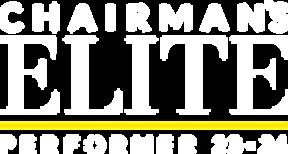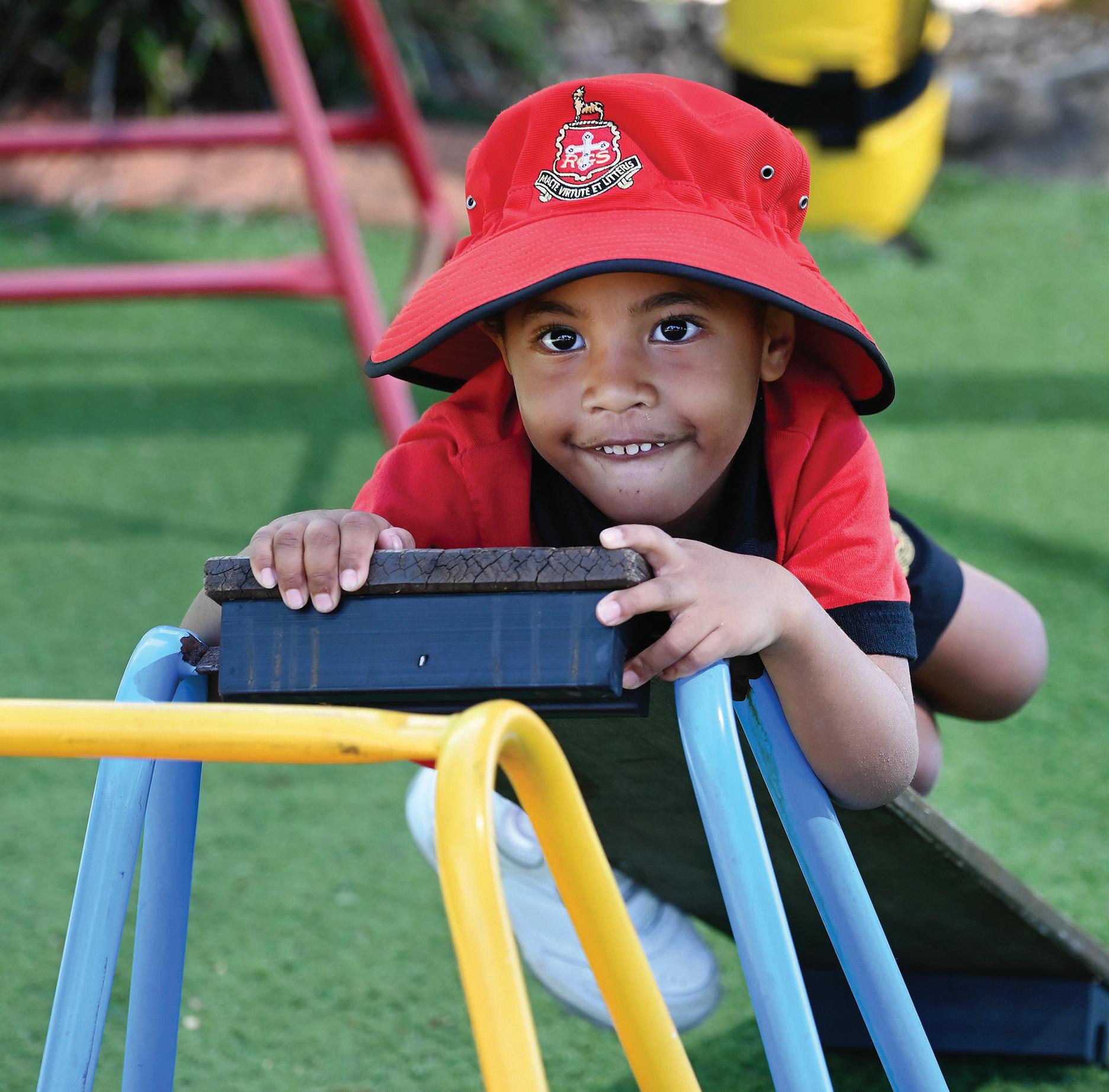

Around the Classrooms at RGS Highlights
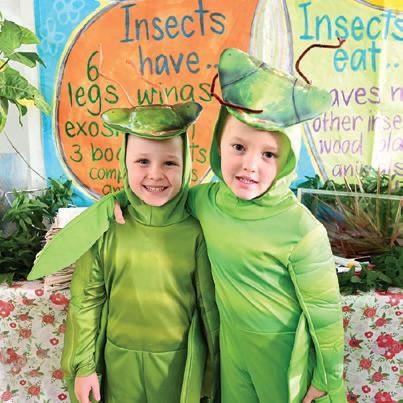
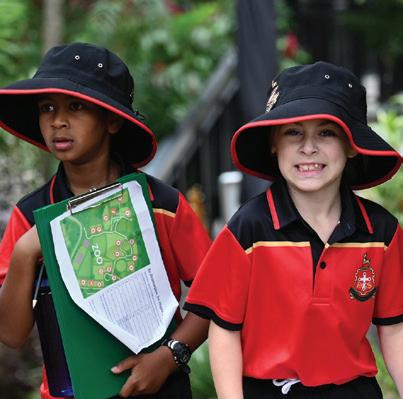
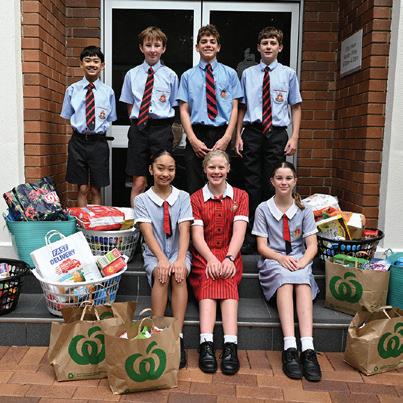
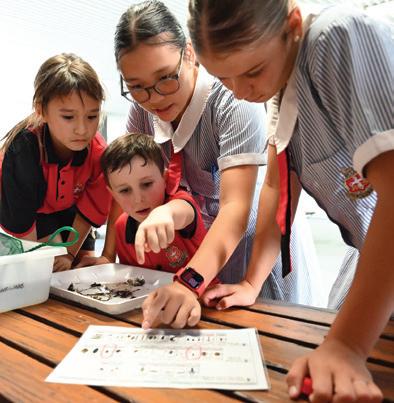
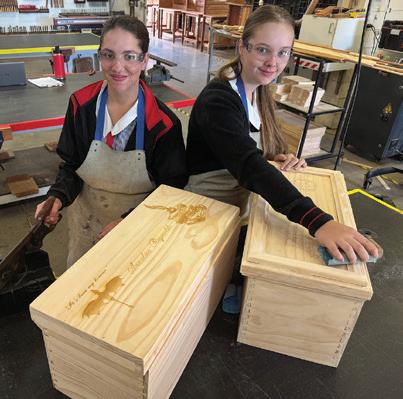
YEAR 1 BUGS
Bug Experts
RGS Year 1 students have enlightened their families with a wealth of knowledge about bugs during their Term 2 Science studies. Not only did the students learn lots of new fun and interesting facts, but so did their parents. The students participated in bug-themed activities throughout the term in each of the four Year 1 classrooms before ending the studies with the great Bug Ball day! The day started with the Bug Parade, where the children proudly displayed their bug costumes for families, friends, and fellow Primary students. It was then back to the classroom for a range of activities ranging from designing and making insect biscuits, creating insect painted rocks and other insect craft. The Bug Dance Party in Duggan Hall was the perfect way to wrap up the celebrations on all things bugs.
YEAR 3 EXPLORERS
Creative Learning RGS Year 3 classes ventured to the Rockhampton Botanic Gardens and Zoo during Term 2 for some outdoor studies. This term, the students studied lifecycles in Science, and looked at change in the community for Humanities and Social Science studies. The students visited the zoo, and loved seeing the various animals from the chimpanzees to the saltwater crocodiles and meerkats. The intrepid explorers were kept busy completing their worksheets as they discovered new information about the zoo’s animals. The students also explored the plants in the gardens, while in their change studies, the classes looked at how the Rockhampton Botanic Gardens had changed and developed over the years. Established in 1869, the Rockhampton Botanic Gardens is one of the oldest public gardens in the country, spanning 33 hectares.
YEAR 7 COMMUNITY
Hands of Support
RGS Year 7 families are doing their bit to help our region’s families in need. The Year 7 cohort donated non-perishable goods to Rockhampton Regional Council’s Hands of Support event (formerly known as Homeless Connect) event, held at the Rockhampton Showgrounds in May. The oneday event aimed to provide people who are homeless, at risk of homelessness, or experiencing hardship, with an opportunity to access a range of services and make connections with relevant agencies. In past years, this event has provided over 13,648 services to more than 2,279 people. Council anticipated over 300 guests to attend this year’s event. Visiting the School to collect the donations was Rockhampton Regional Council employee, and RGS Alumni, Lucy Chay (RGS 2022).
Year 9 SCIENCE
Freshwater Ecosystems
RGS Year 1 and Year 9 Marine Operations students combined their “bug” knowledge during the term when the two year levels joined together for a lesson in water bugs. Year 9 student Giovanna Sidharta recalled the opportunity: “This term we investigated Freshwater Ecosystems and their water quality. Each week, we visited Murray Lagoon and the Fitzroy River, collecting and testing the water. We also surveyed macroinvertebrates and fish. Our Year 9 Marine class visited the Year 1’s and created a water bug activity, as they also studied bugs this term. We set up stations and filled them with buckets of the collected water and bugs and placed little nets around them for the Year 1’s to use. They then went around the different stations, each having a go at fishing out the bugs and identifying them. This was an immersive experience for both year levels.”
Year 11 WORKSHOP
Connecting skills
Year 11 Industrial Technology Skills classes crafted timber chests using hoop pine and the dovetail routing jig process, mastering near perfect dovetail joints that were both structural and aesthetic. Mentored by Design Technologies teacher Mr Riley Hunt, students Anna Reynolds and Saeber Donovan constructed their interior furnishing storage solution, further honing their woodworking skills and developing accuracy and attention to detail. They also utilised the mitre box and tenon saw to add timber moulding edges to their chest, while finishing the lid with a personalised laser engraved motif. This project enhanced students’ design capabilities and safety awareness with hand and power tools, while fostering concentration, creativity and manual skills within a very engaging task.
Thank you RGS Co-Curricular Sponsors. For sponsorship enquiries contact Todd Wells, Director of Co-Curricular at twells@rgs.qld.edu.au
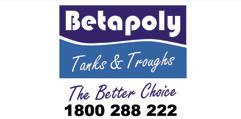
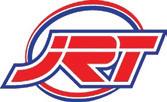










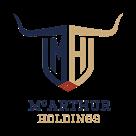

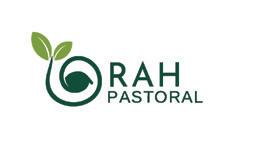
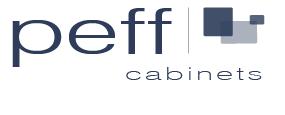






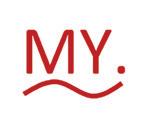

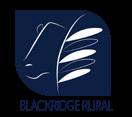

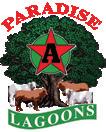
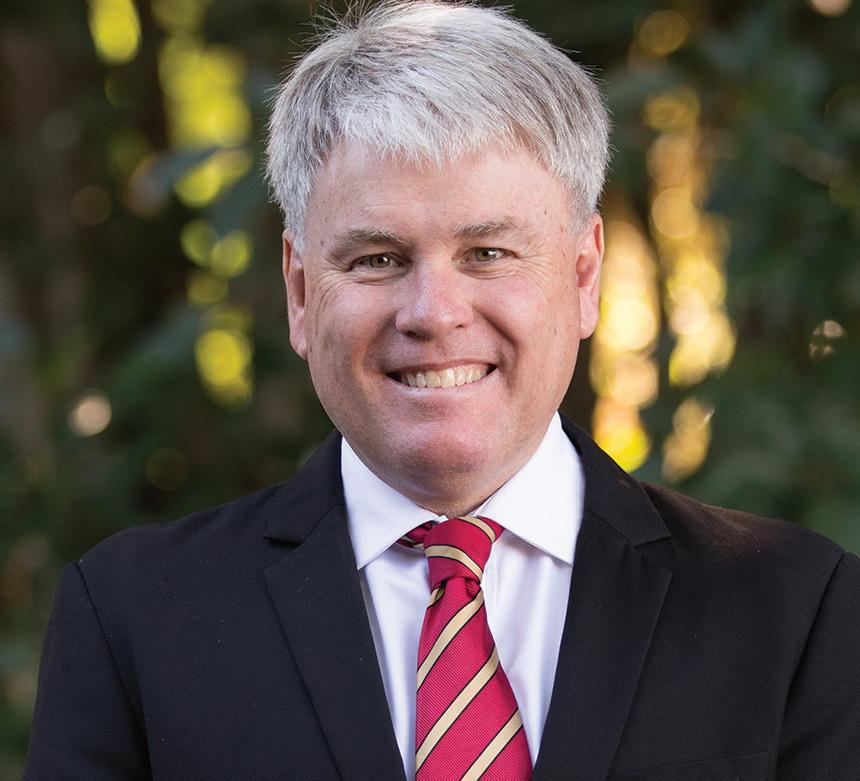
Navigating a changing landscape
At The Rockhampton Grammar School, we have always been committed to preparing our students for the world into which they will enter – equipping them not only with knowledge, but with the skills and mindset to navigate a rapidly changing landscape. Artificial Intelligence (AI) is one of the most significant shifts of our time, and while public conversation around AI has surged recently, RGS has been quietly and deliberately exploring this space for several years.
Our engagement with AI began over three years ago. Since then, our staff have attended and presented at conferences, participated in professional learning, trialled tools in classrooms, and completed special fellowship projects to explore AI’s potential in education. This careful groundwork reflects our approach to innovation: thoughtful, measured, and always centred on what is best for our students.
In October last year, this work was formalised with the creation of the AI Leadership Group –a dedicated team of teaching and non-teaching staff charged with guiding our AI integration strategy. Their work ensures that as we adopt this technology more broadly, we do so with clear purpose, strong ethical foundations, and a focus on educational excellence. Next term marks a significant step forward. We will formally launch AI integration across the School, provide ongoing staff development, and introduce our AI guidelines to students, parents and staff. Central to this is the SEE framework, which ensures that AI is used Safely, Ethically and Effectively across the School. Through the SEE framework, we are building a strong foundation for our students to become capable, responsible, and thoughtful users of AI.
We are proud to be considered leaders in this space within the education sector, and we take this responsibility seriously. Our goal is not to replace people with technology, but to enhance the incredible work already being done. In the classroom, AI can support teachers in lesson planning, streamline administrative tasks, and offer students personalised learning opportunities. Beyond teaching, it has the potential to improve efficiency in areas such as finance, marketing, and operations – allowing us to focus our resources where they matter most.
Throughout this journey, our commitment to relationships remains unchanged. Technology will never replace the care, character, and human connection that define RGS.
This is just the beginning. With curiosity, responsibility, and a clear strategic vision, RGS is embracing AI not as a trend, but as a long-term commitment to excellence in education.

The Rockhampton Grammar School takes seriously the challenge of preparing students for today’s world. We treat each student as a whole person through a balance of academic, sporting, co-curricular and social activities. Our School motto is Macte Virtute et Litteris or Grow in Character and Scholarship.
Capricornus Quarterly is published by:
The Rockhampton Grammar School
Archer Street, Rockhampton QLD 4700, Australia www.rgs.qld.edu.au
(+61) 07 4936 0600
ISSN 1839-4663
©2022 The Rockhampton Grammar School
Dr Phillip Moulds OAM, Headmaster 07 4936 0615
Headmaster@rgs.qld.edu.au
Enrolment enquiries
The Registrar, Mrs Marissa Holloway 07 4936 0700
Registrar@rgs.qld.edu.au
Editorial & Advertising
Mrs Ashleigh Harvey, Director Development and Communications 07 4936 0668 aharvey@rgs.qld.edu.au
Mrs Rachael McDonald 07 4936 0776 rmcdonald@rgs.qld.edu.au
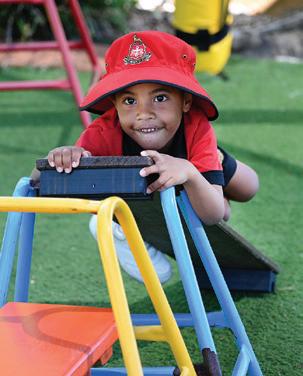
Book Club with a Twist
Year 11 Economics at RGS swapped desks for picnic rugs in a 40-minute outdoor lesson that was anything but ordinary. Economics teacher Mr Tom Hennessy explains.
Rather than diving into a textbook, the students joined a “Book Club with a Twist” –a casual but purposeful session where they analysed a top-marked assessment response. The goal? To break down what makes a great Economics assignment – not just the content, but the structure, vocabulary, and clarity that examiners look for.
The session took place under the trees on campus. It created the perfect environment for students to speak freely, ask questions, and learn from each other – without the pressure of a formal classroom. The change of scene sparked curiosity and energy.
Surveys conducted before and after the lesson showed a 13% boost in student confidence overall
I wanted students to actually see what success looks like and learn how to apply it to their own work. But more than that, I wanted them to feel confident doing it.
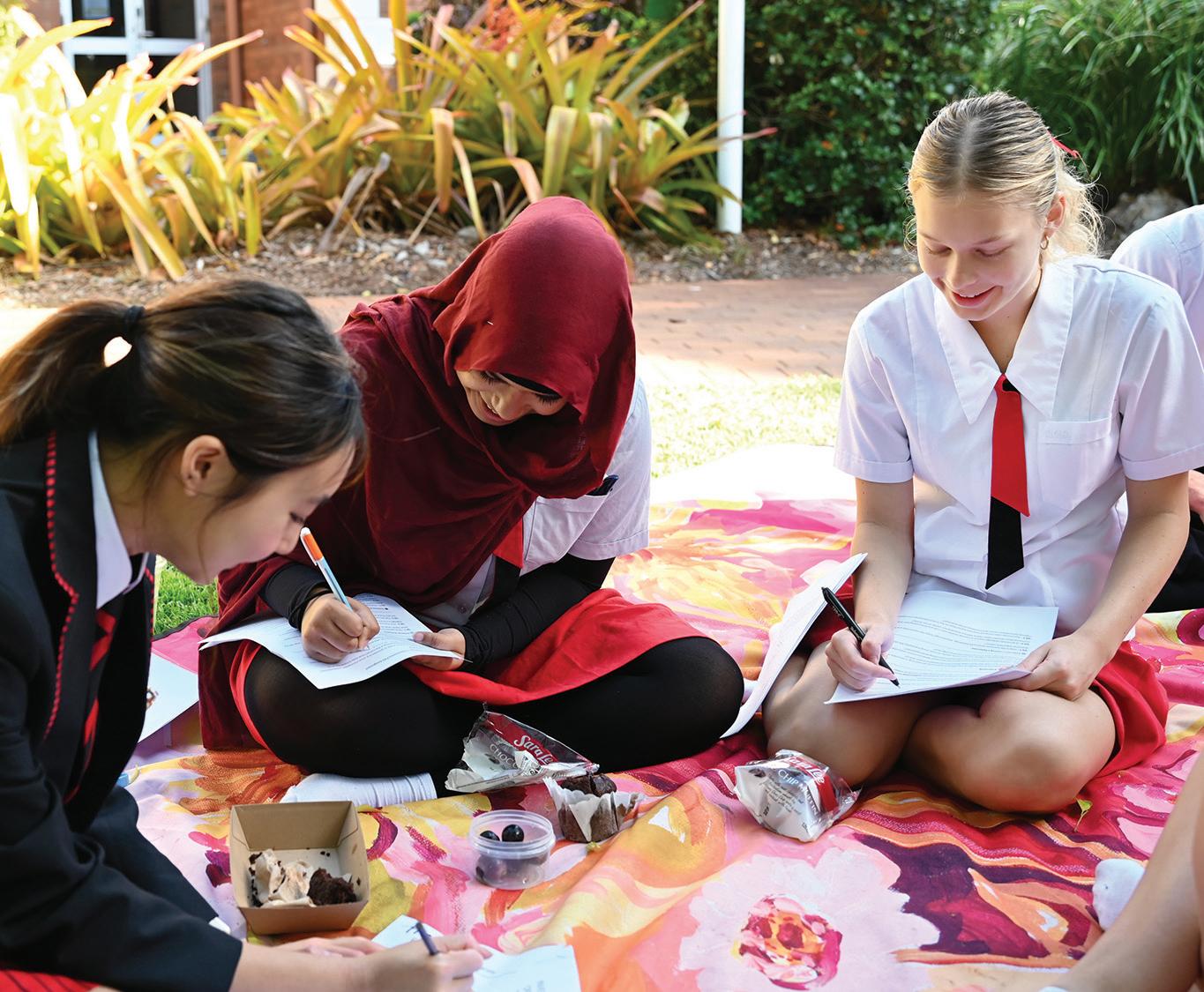
And it worked. Surveys conducted before and after the lesson showed a 13% boost in student confidence overall – with a 22% increase in students saying they now knew how to use example responses to improve their own writing. There were also clear gains in their understanding of core economic concepts like supply and demand, and their ability to structure a strong response. The informal, discussion-based approach also helped students better understand what teachers and examiners are looking for –something that can often feel like a mystery in Senior subjects.
More than just a novel activity, the “Book Club” format is now being considered as a regular feature in the lead-up to major assessments. It’s a low-prep but high-impact strategy that supports both academic achievement and student wellbeing.
When students feel empowered, capable, and in control of their learning, they thrive. That’s what this was really about – building confidence without losing the joy. At RGS, even a patch of grass and a picnic rug can become a classroom.
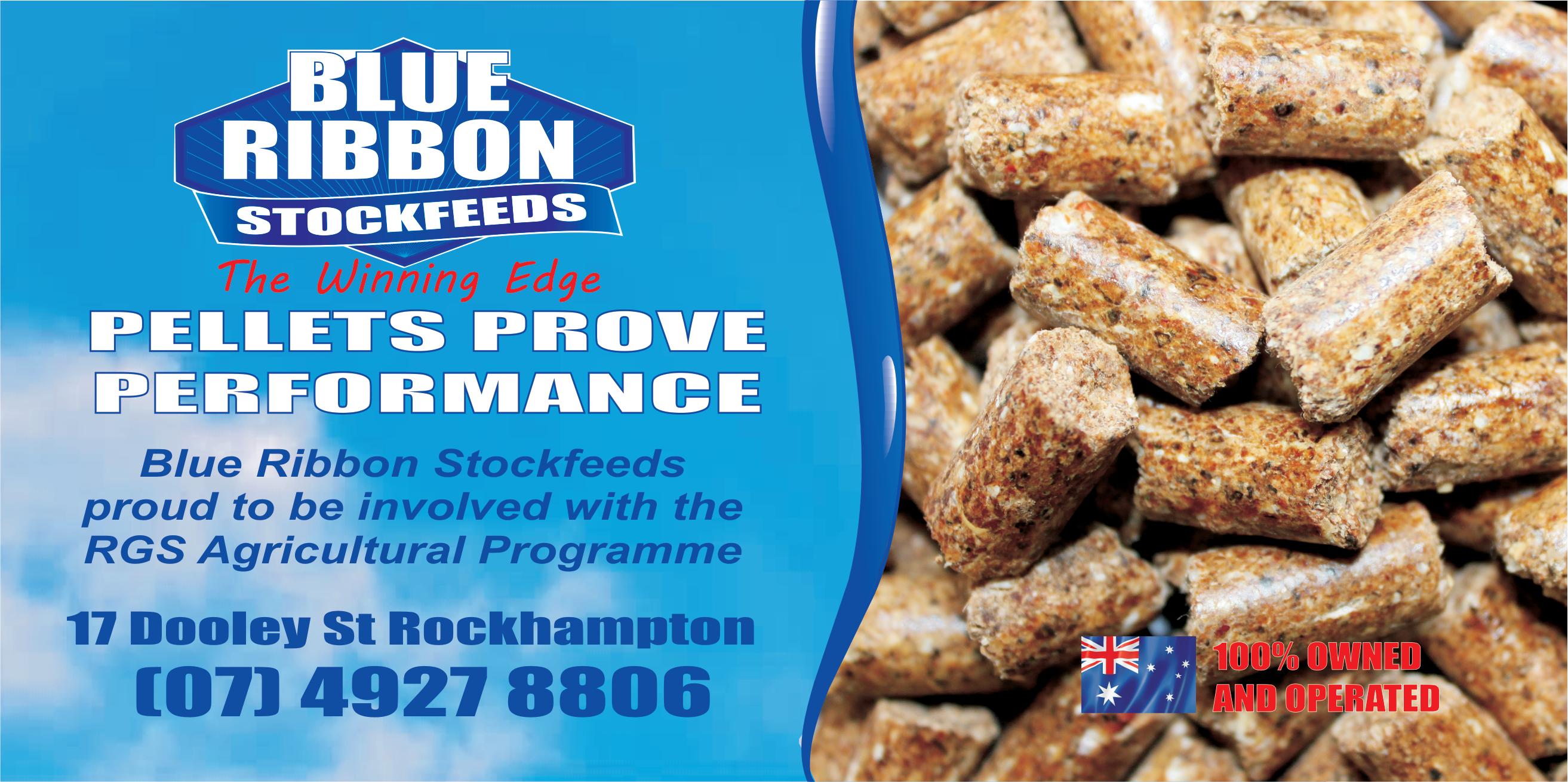

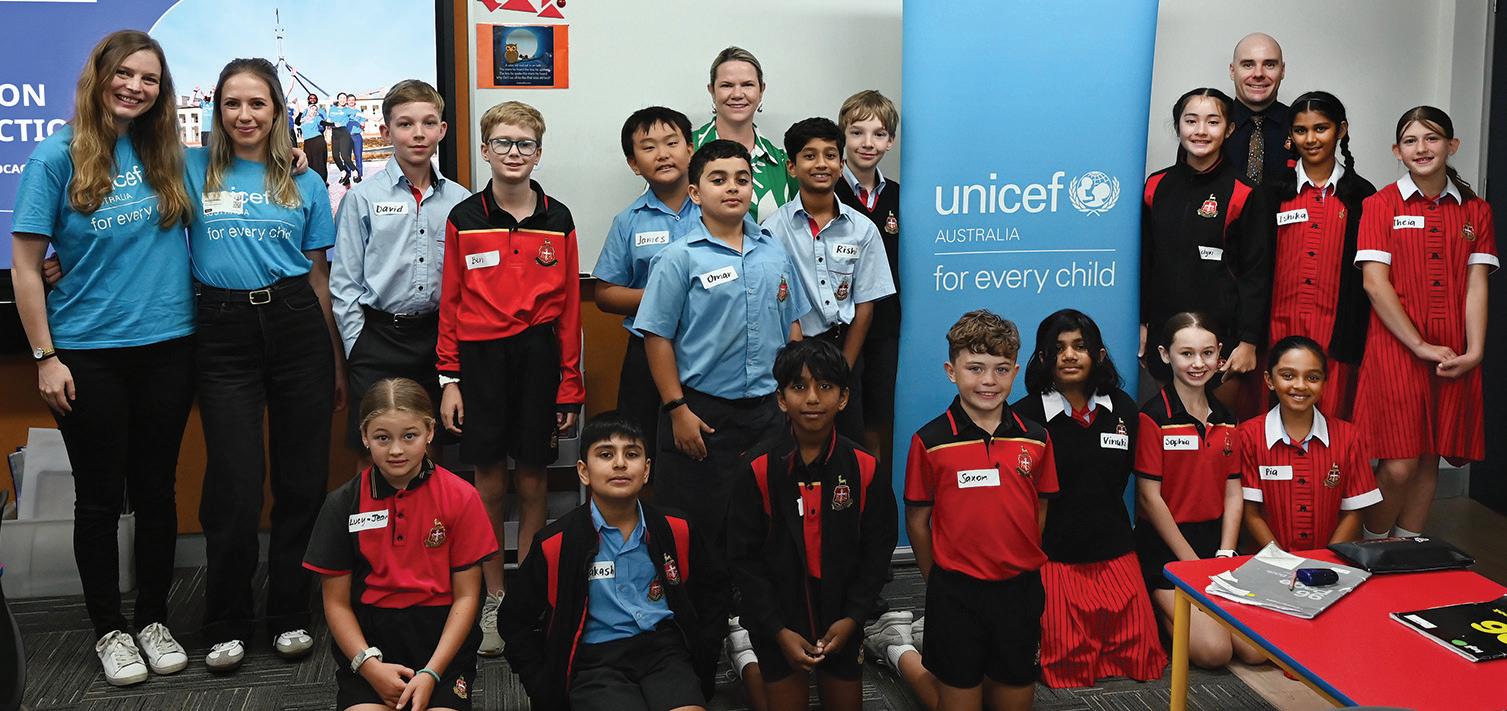
Student voices heard in Earth Action
RGS Year 5 students have enthusiastically joined UNICEF Australia’s Operation Earth Action challenge. A project aimed at empowering students to address the challenge of upholding children’s rights in the face of natural disasters, Operation Earth Action blends humanitarian spirit with real-world examples and expertise.
UNICEF Australia Child and Youth Engagement Manager Zoe Grayan and UNICEF Project Coordinator Sophie Mayes were inspired by the RGS students’ energy and passion during their one-day workshop visit to RGS last term.
This is the first time the Operation Earth Action project has ventured outside of Sydney schools, with RGS one of only two Queensland schools participating, along with schools from Victoria and the Northern Territory.
“Some students outside of Sydney have livedexperience in natural disasters. To have their expertise, insights and reflections makes this programme so much richer and more real,’’ Zoe said.
The workshops discussed child rights and natural disasters, before embarking on a design sprint to prototype innovative solutions in response to a natural disaster.
Zoe said Operation Earth Action was a design thinking programme based around making sure they put child rights at the centre of a natural disaster response.
This innovative programme helps elevate children’s needs by asking them to take on the role of stakeholders tasked with protecting a
chosen child’s right should a natural disaster strike.
Zoe said in the design thinking workshop they went through a number of phases involved in disaster response, including empathy mapping.
“We want the children to empathise with what it would be like for a child in a natural disaster in terms of what they think, how they would feel, and what’s happening around them,’’ Zoe said.
“We want the children to empathise with what it would be like for a child in a natural disaster.”
“Children are affected by natural disasters and climate around the world yet are having the least amount of say.”
The UNICEF team are already excited to see what natural disaster prototypes the RGS students can create.
“We had such a great time and were so impressed by the students’ creativity, compassion and interest in the programme,’’ Zoe said.
RGS Year 5 teacher Mr Lachlan Libke said the programme worked in well with the Year 5 curriculum on natural disasters that they studied in Term 1.
“This is heavily student focused and student driven and we as teachers can help facilitate that to help put the students on the forefront of what they want to produce,’’ Mr Libke said.
“UNICEF does an amazing job levelling this programme towards the students and keeping them engaged.”
The 16 students selected to participate in Operational Earth Action, who volunteered their time to join the co-curricular activity, will work on their prototypes throughout Term 3 before preparing their prototype presentations.
RGS Head of Primary Mrs Kate Harris was also impressed with the deep engagement from the students.
“The core themes of the project – student voice for change, empathy, and building a positive global footprint – are powerful and align beautifully with the School’s values and our Leadership for All initiative,’’ Mrs Harris said.
IN THE NEWS
The Rockhampton Grammar School provides many avenues for our community to partner with groups outside the School and gain greater insights into opportunities and experiences beyond the classroom.
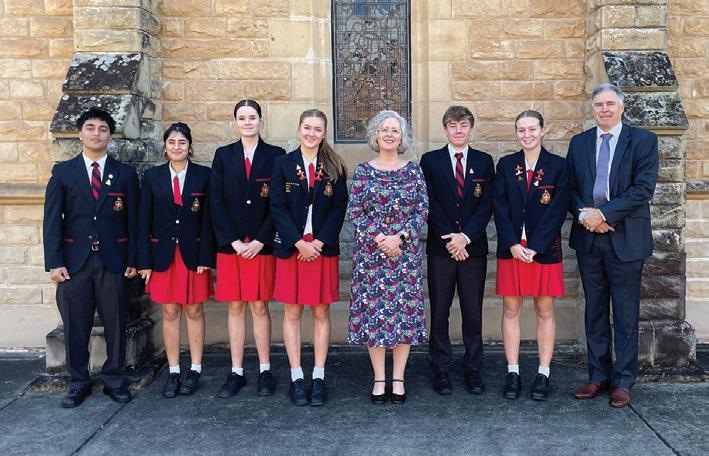
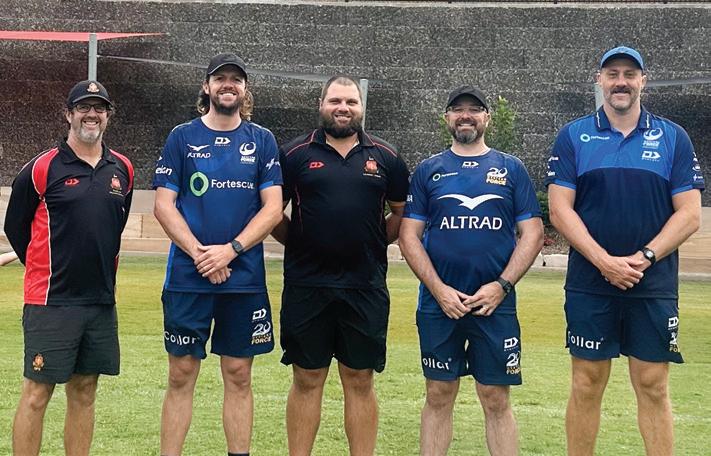
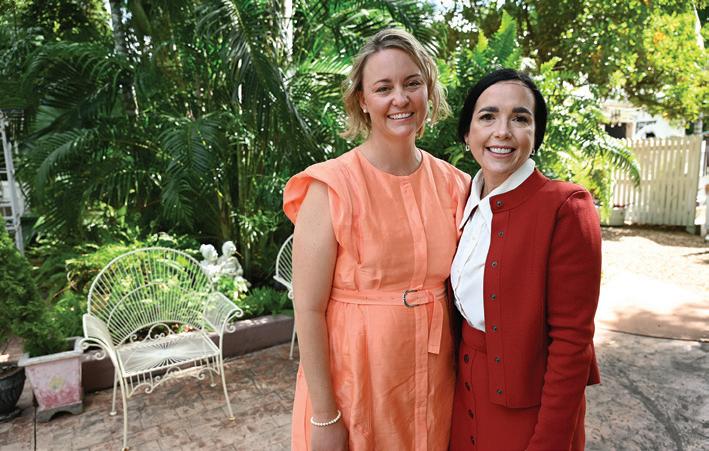
Legal Season
RGS Legal Studies students attended the opening of the Legal Year Service at St Joseph’s Cathedral. Officially marking the beginning of the legal year, members of the judiciary and legal professions gathered to reaffirm their commitment to upholding the rule of law in our communities. The Right Reverend Ross Nicholson and the Honourable Helen Bowskill, Chief Justice of Queensland, spoke on the importance of justice and mercy in the practice of law. The students reflected on the role of the profession and engaged with members of the community who offered insights into study pathways and work experience.
Joining Forces
The Rockhampton Grammar School and the Western Force Rugby Union Club are excited to announce a new and dynamic partnership.
The signing of a Memorandum of Understanding (MOU) will pave the way for enhanced collaboration in the areas of youth development, rugby training, and community engagement.
RGS Headmaster Dr Phillip Moulds said the School was thrilled to enter into this partnership with such a prestigious and respected organisation as the Western Force Rugby Union Club.
RGS Parent Association
It was a busy term for the RGS Parent Association, hosting both the Mother’s Day High Tea at St Aubin’s Village followed by joining the Rockhampton Winter Racing Carnival, with the Association’s Race Day function at Callaghan Park.
At the Mother’s Day High Tea, guest speakers, and RGS parents, Krystal Caton and Meg Deaves provided insightful talks into their own personal journey, both as a mother and in their respective careers.

Music Festival steals the show
RGS Primary and Secondary students proudly presented their musical talents on the Pilbeam Theatre stage in Term 2. From choirs, to ensembles, an Alumni jazz group, musicals, incredible solo performances, and a memorable finale, there was something for everyone at this year’s RGS Music Festival.
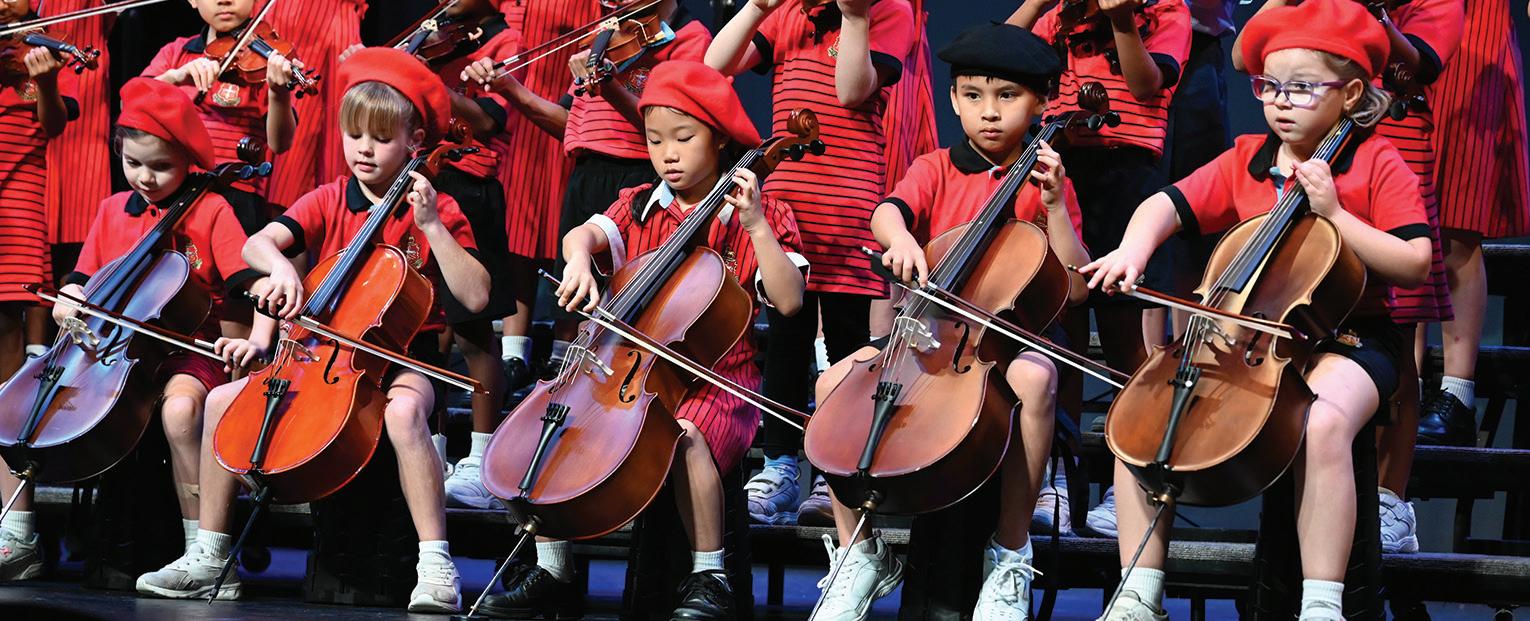
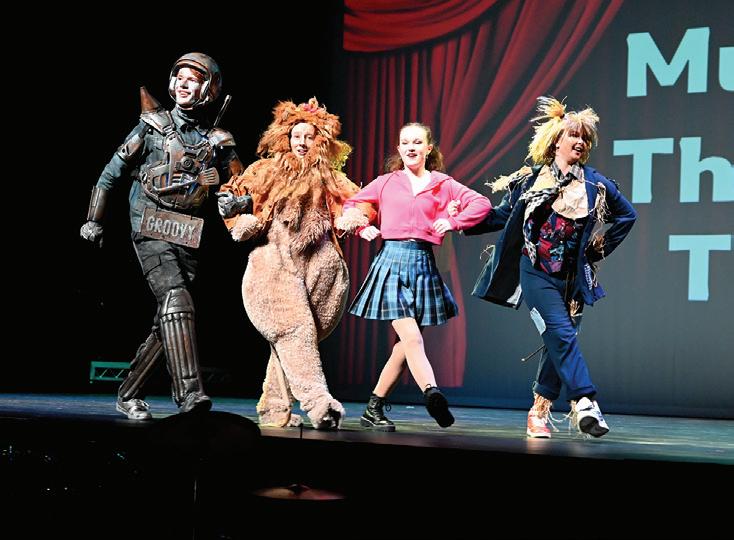
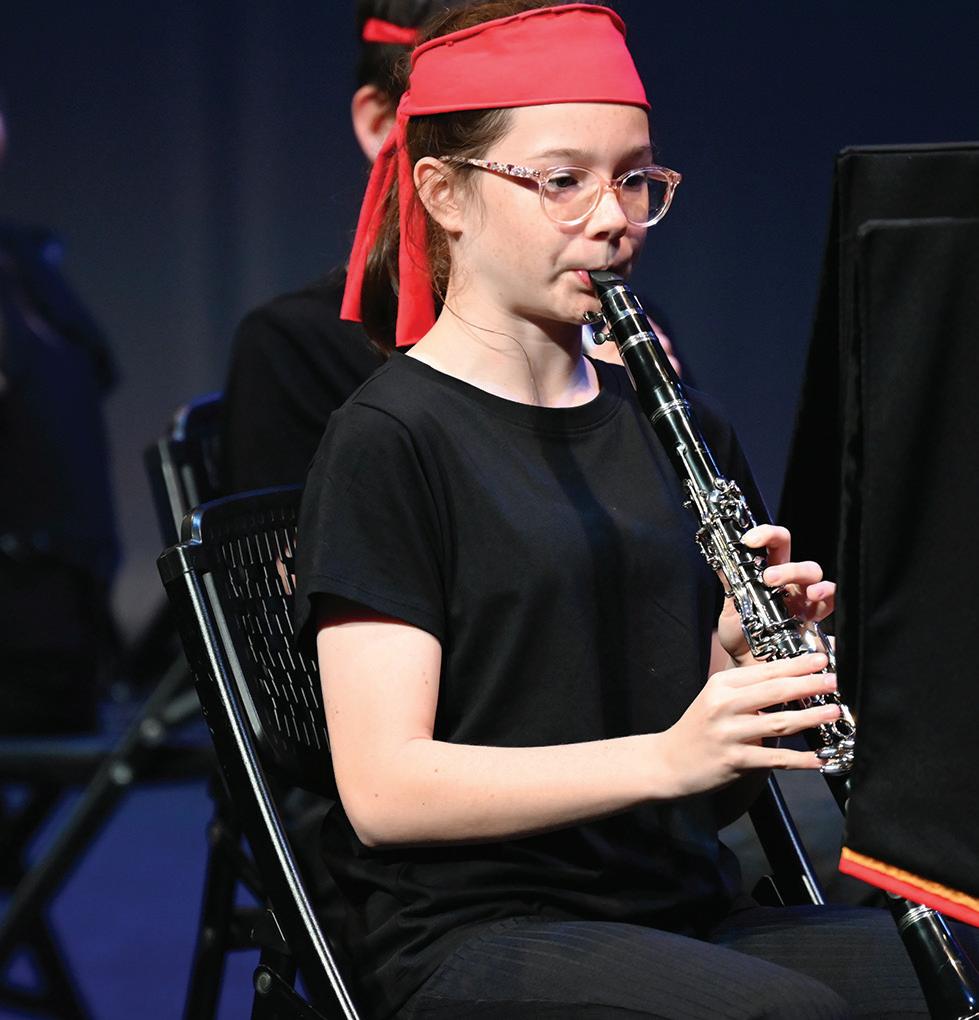
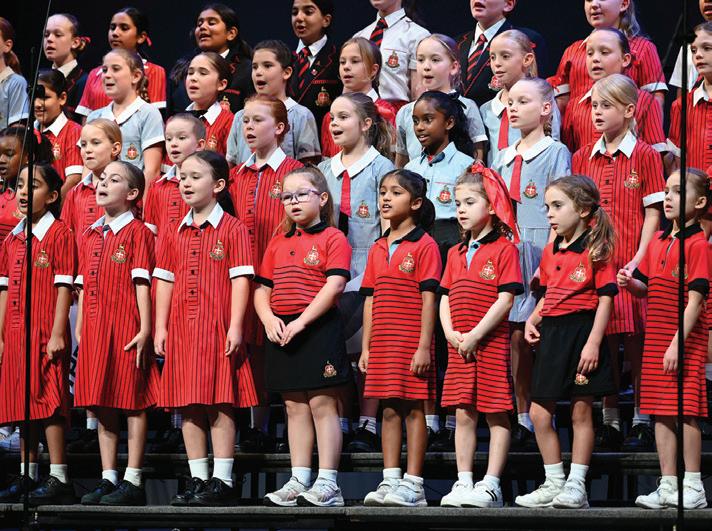
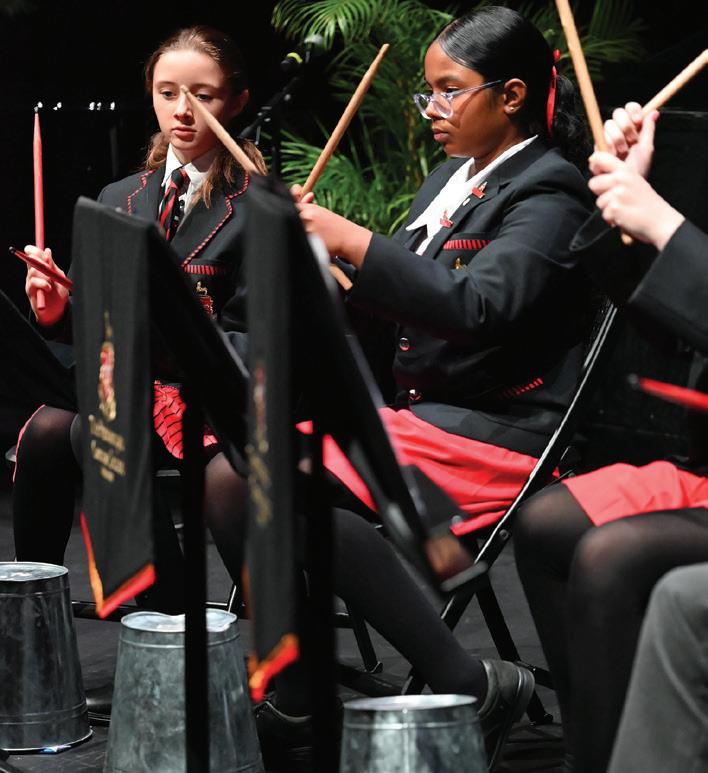
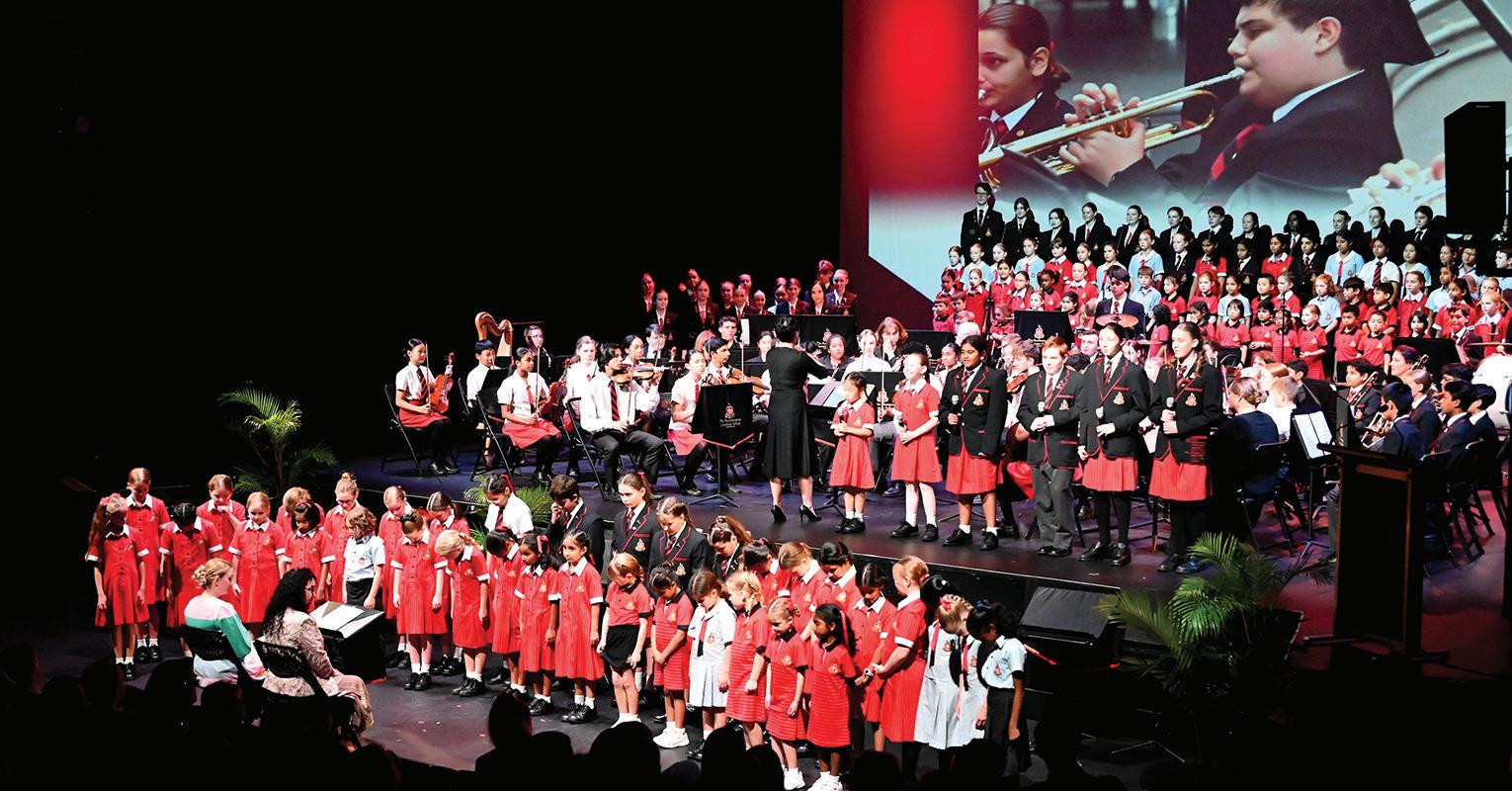
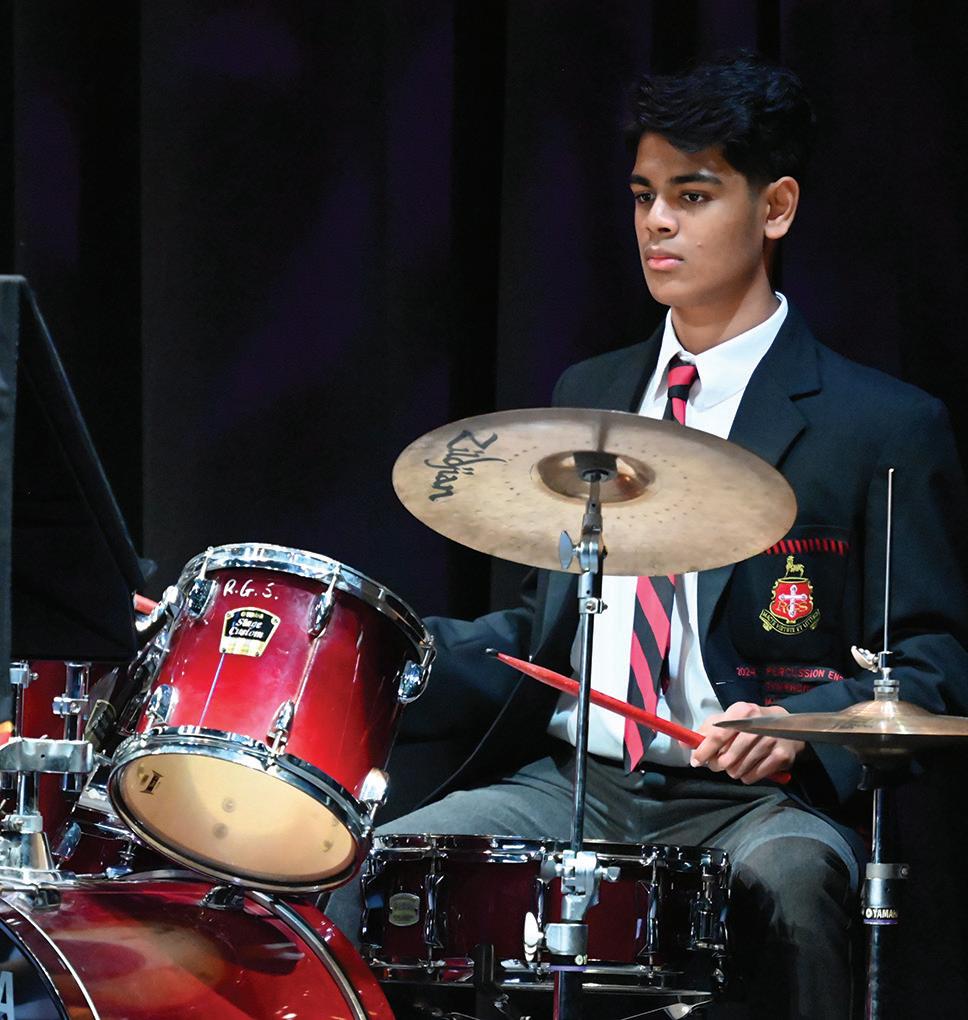
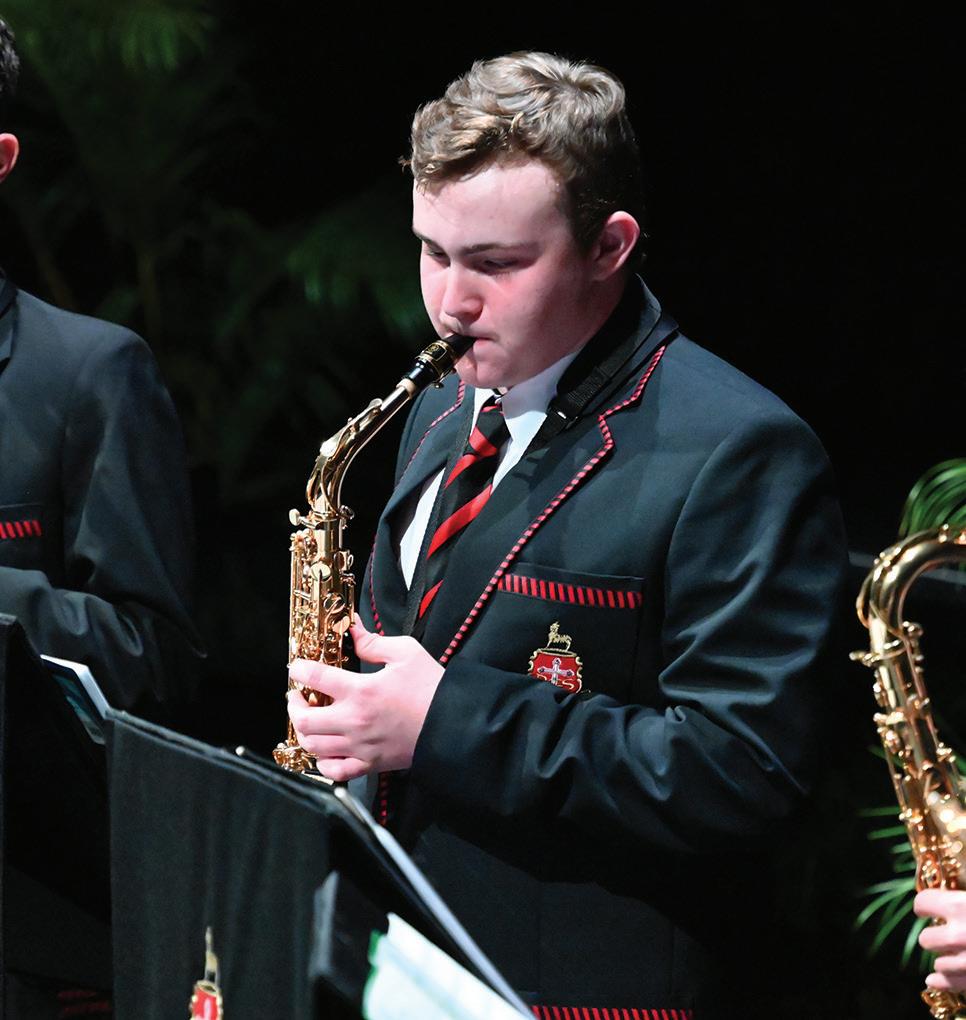
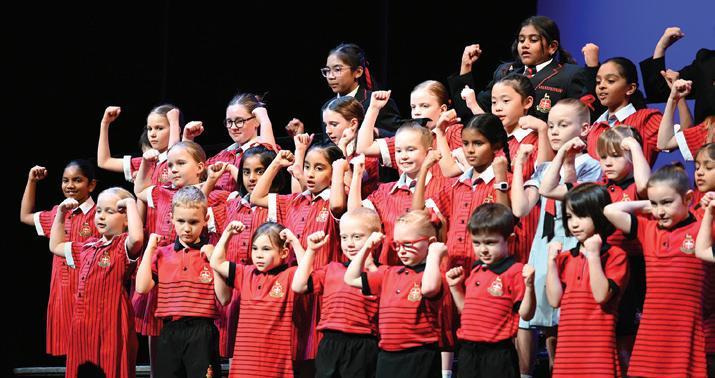
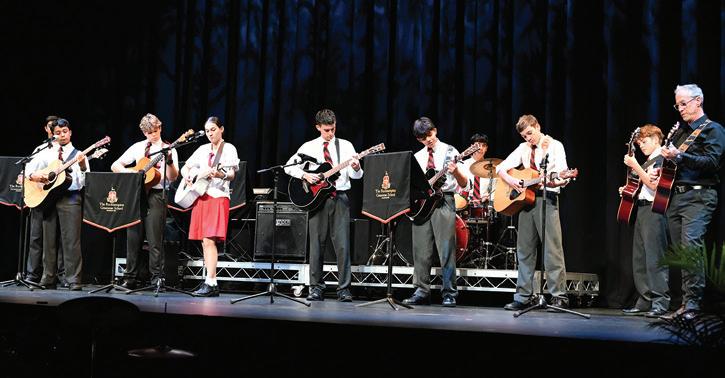
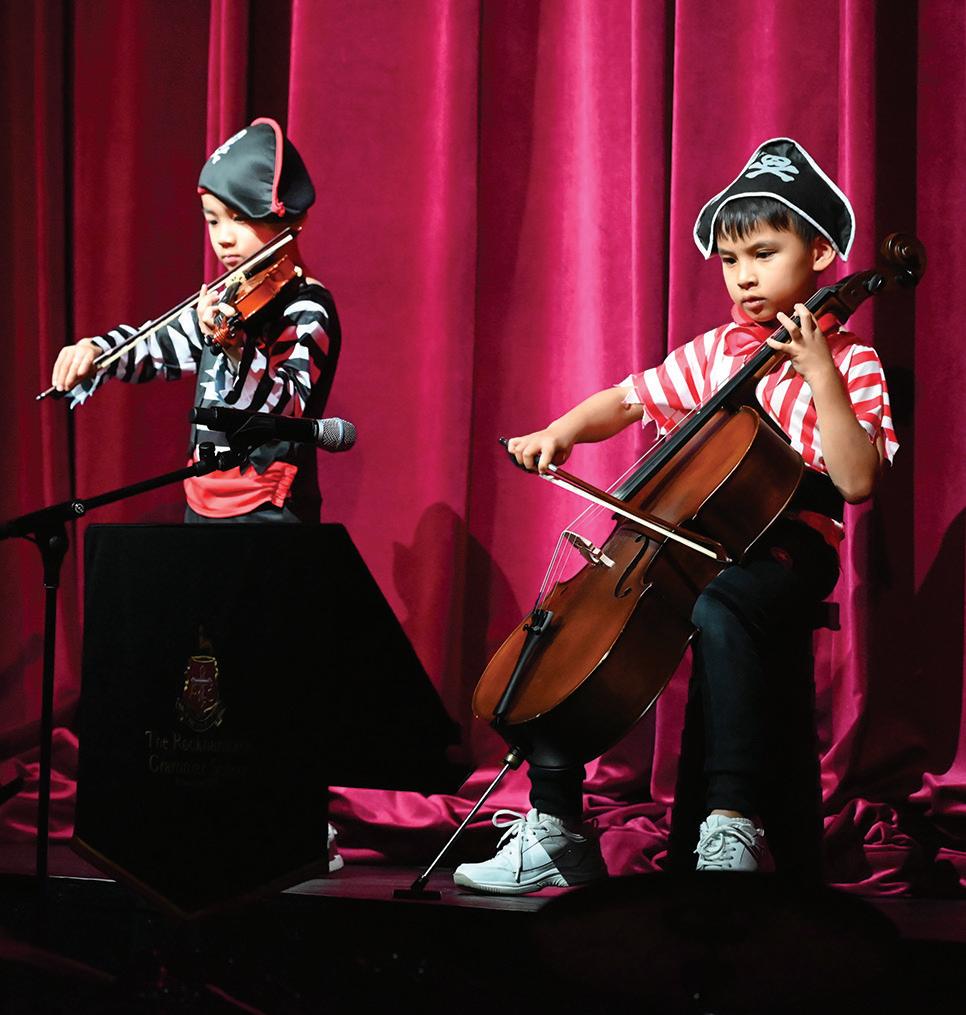
RGS ALUMNI
RGS Alumni regularly travel different paths before finding a common interest to reconnect with Alumni from across the years. Whether that’s on the stage in a musical production or having a chat over the fence on a neighbouring property, there are always RGS stories to share.
Commitment to the arts
RGS alumni and staff took centre stage in Rockhampton Musical Union’s production of Come From Away, performed at RMU Hall across two weekends in May. Matthew Dennis (RGS 2009), Emma Girle (RGS 2010), Darby Cringle (RGS 2022 and current staff), and Glenn Marquez (RGS current staff) were all involved in bringing this powerful story to life. The musical, based on true events from 9/11, highlighted compassion and community in times of crisis. Their involvement was a wonderful example of the RGS community’s ongoing engagement in the arts beyond the school gates.
Reunions continued on the Pilbeam Theatre stage in June when the RGS Alumni jazz band performed at the RGS Music Festival. Celebrating RGS Music were Brad Acutt (RGS 1984), Catherine & Elizabeth Vanderleur (RGS 2018), Neeve Saw (RGS 2018, Darby Cringle (RGS 2022), Claire Moulds (RGS 2022), Alain Li (RGS 2023), Ben Reid (RGS 2023), Chris Ilott (RGS 2023), Kyan Sinclair (RGS 2023), and Max Morrison (RGS 2023).
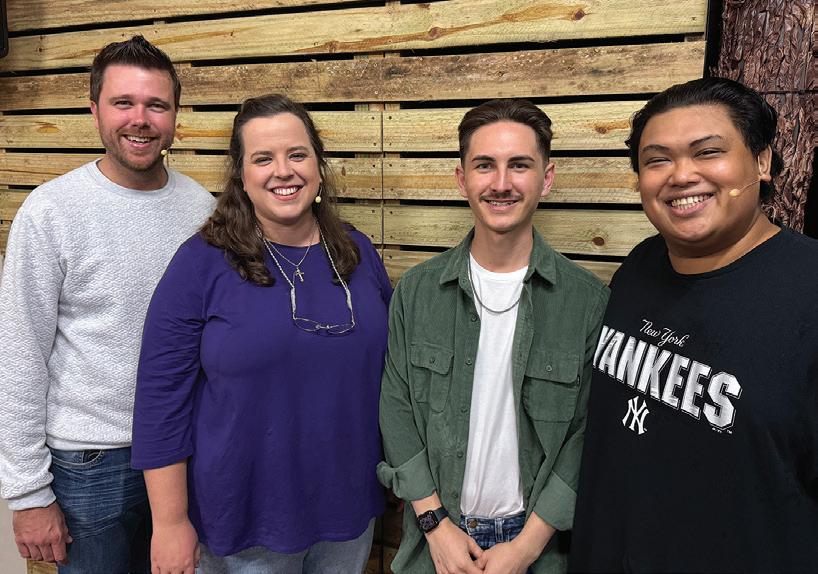
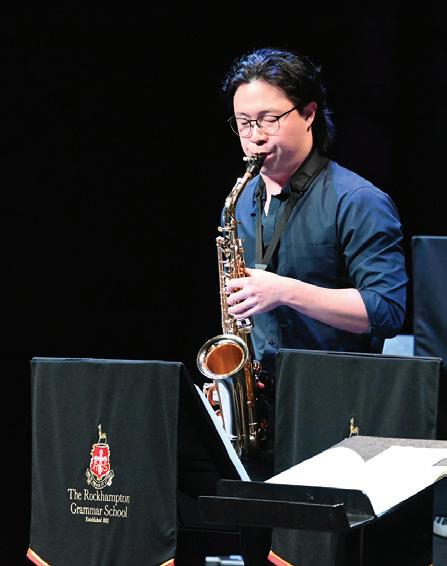
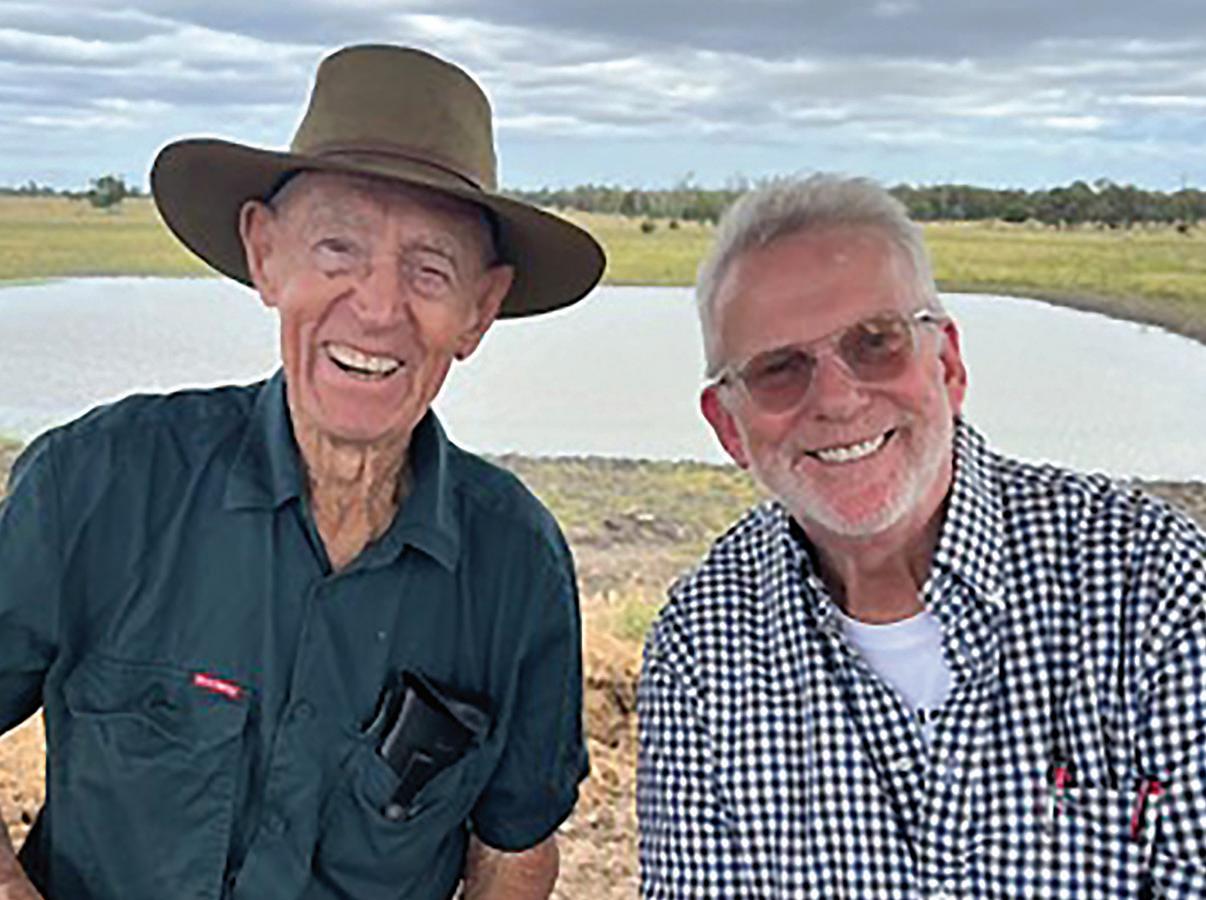
Boarding creates lifelong mates
There is something about boarding at RGS that stays with you for life. No matter when you attended or who was in charge, there’s a spirit created between students and so is the case with John Maclean (RGS 1941) and Neil Jenman (RGS 1969). Decades later, these two “old boys” are the closest of friends. Both live on neighbouring cattle stations in Baralaba that have been in their families for generations. “I was grateful for many things I learned at RGS, but mateship was by far the best lesson. And today, when I visit the School – under Dr Moulds – that bonding feeling feels stronger than ever,’’ Neil said.
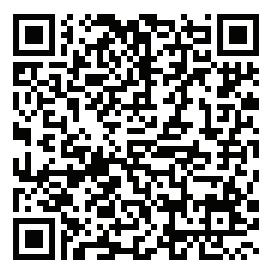

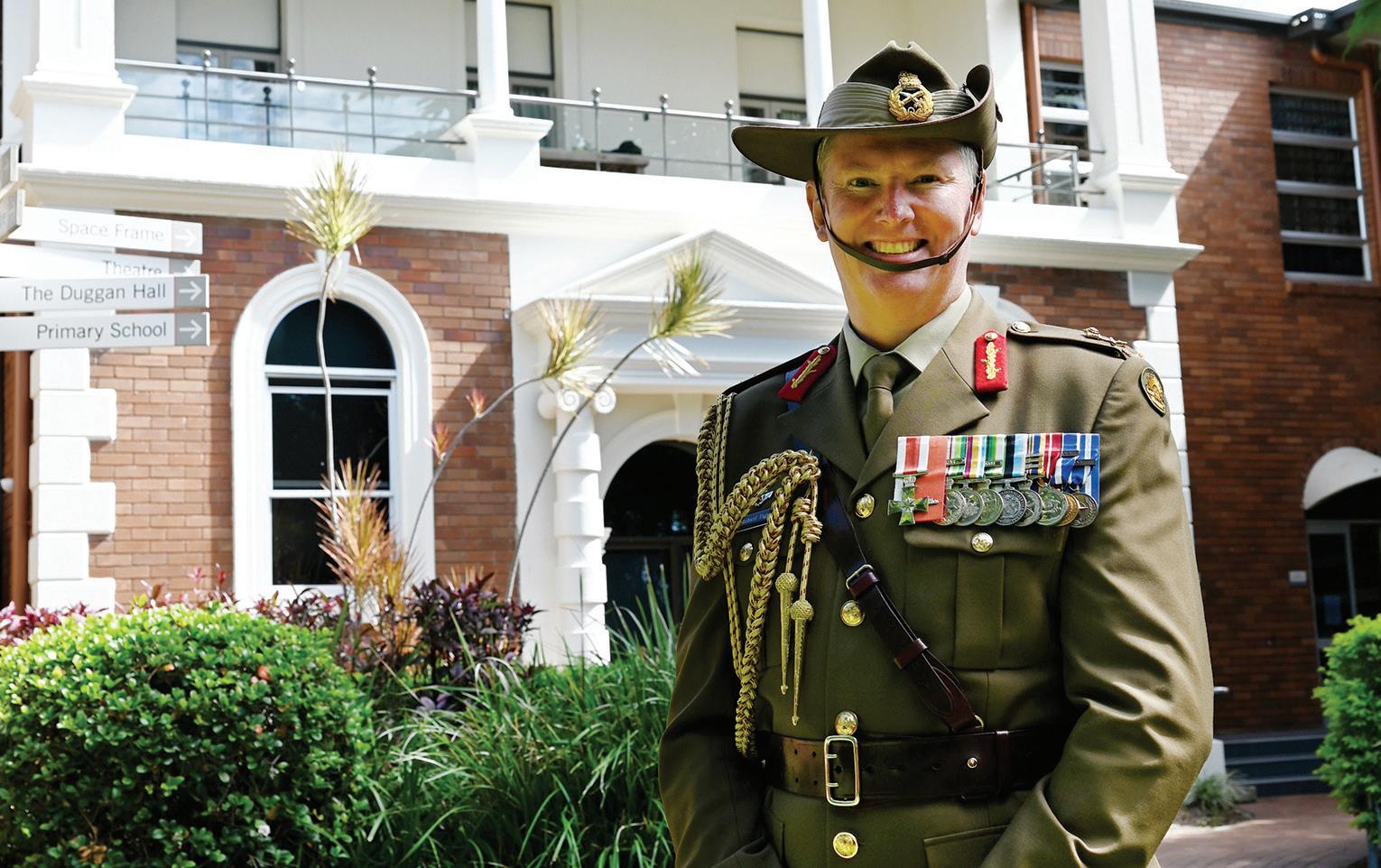
My story
Major General Richard Vagg, DSC (RGS 1990) described himself as an “enthusiastic average student” during his school years at RGS. After realising a civil engineering degree wasn’t for him, Major General Vagg joined the Army and has never looked back – joining on a “whim” and wanting adventure.
How has the young man who joined the Army in the early 1990s changed over the years?
“Growing up I loved being involved in team sports, like rugby, rowing and cricket, and I looked at the Army as an opportunity to do all those things and be involved in a job that revolved around teamwork. To be honest, I had no real understanding of what the Army was going to offer, but in terms of job satisfaction, Army has delivered in spades. When I first joined I was super enthusiastic, very naïve and, if I was really honest with myself, a bit flippant about life. Now I’ve developed a level of maturity as I’ve gone through. I’m much more worldly, far more balanced in my views, and what I discovered about myself is I have a real sense of duty and service, which I think is inherent to my nature, which I previously didn’t realise. I fell into the right career path.”
You have served overseas in Kosovo, Afghanistan, and Iraq – how have you managed the fear of warfare?
“That never entered my thought process when I was thinking about joining the Army. There does become a point in your training though that you realise you’re actually in a pretty serious business. I think most service personnel at some point in their training have this realisation, it may happen early or later for others. Mine happened early in my training at Duntroon. I had a rational argument in my head
regarding what I was training to do and what Army would require and expect from me as an Army Officer. After I followed the logic through, weighed that up against my own values, and came to the realisation that I was comfortable with what I was doing and what Army would ask of me. From that moment I knew that I would be comfortable deploying on operations. To directly answer your question I was very confident going into each deployment. The training Army has given me throughout my career has prepared me both physically and mentally to do the types of roles that I was being asked to do in those war zones.”
You are currently Head of Land Capability for the Australian Army. How is the fastpaced world of technology impacting Australia’s defence forces?
“It’s very exciting and it’s also a challenge. Given the current strategic environment, it’s also something that we need to be very conscious of, getting it wrong can be disastrous. I manage the modernisation of Army and that’s everything from the concepts on how we will fight, to the structures and design of our Army units. My team also determines and manages the equipment that we use in the Army, which covers everything from our uniforms and boots, the weapons we use, our vehicles and helicopters right down to the radios and computers we use for command and control. What we’re finding
Richard Vagg (RGS 1990)
is that technology will change the character of warfare, for example how you fight, and we are seeing this play out in places like Ukraine where technology is enabling the use of drones and electronic warfare. Technology is developing so quickly and you have to be aware of that when you’re procuring capability. Traditionally defence procurements go over several years, which is akin to buying an iPhone now and having it delivered in four years’ time. One of the big challenges for my team is how do we acquire and field capability, and that is all the things I mentioned before, in a much quicker timeframe.”
What’s your advice for students who are now in the same shoes you were once in at RGS?
“Keep an open mind about what you want to do when you leave school. Year 12 is an important year, but it’s a big world out there with lots of opportunities. I am not sure everyone really knows what they want to do when the leave school, and that is ok. Keep an open mind and give yourself every opportunity to discover what the world has to offer. When you find the thing you enjoy give that everything. The greatest waste is if you find something you enjoy doing, and you have a natural talent for, and you don’t give it everything – then there’s a whole lot of unfulfilled promise. I think this is true for your career, sport and the arts.”


GET A CLOSER LOOK


ROCKHAMPTON NORTH
SUNDAY 17 AUGUST | 9 AM – 12 PM
Explore our TAFE and Uni courses, meet your future lecturers and teaching teams and have your questions answered.
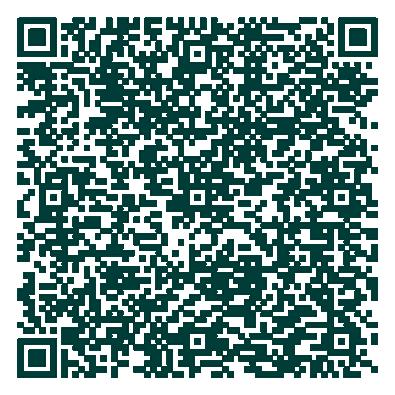
REGISTER NOW


“It’s about commitment, resilience, and learning through doing.”
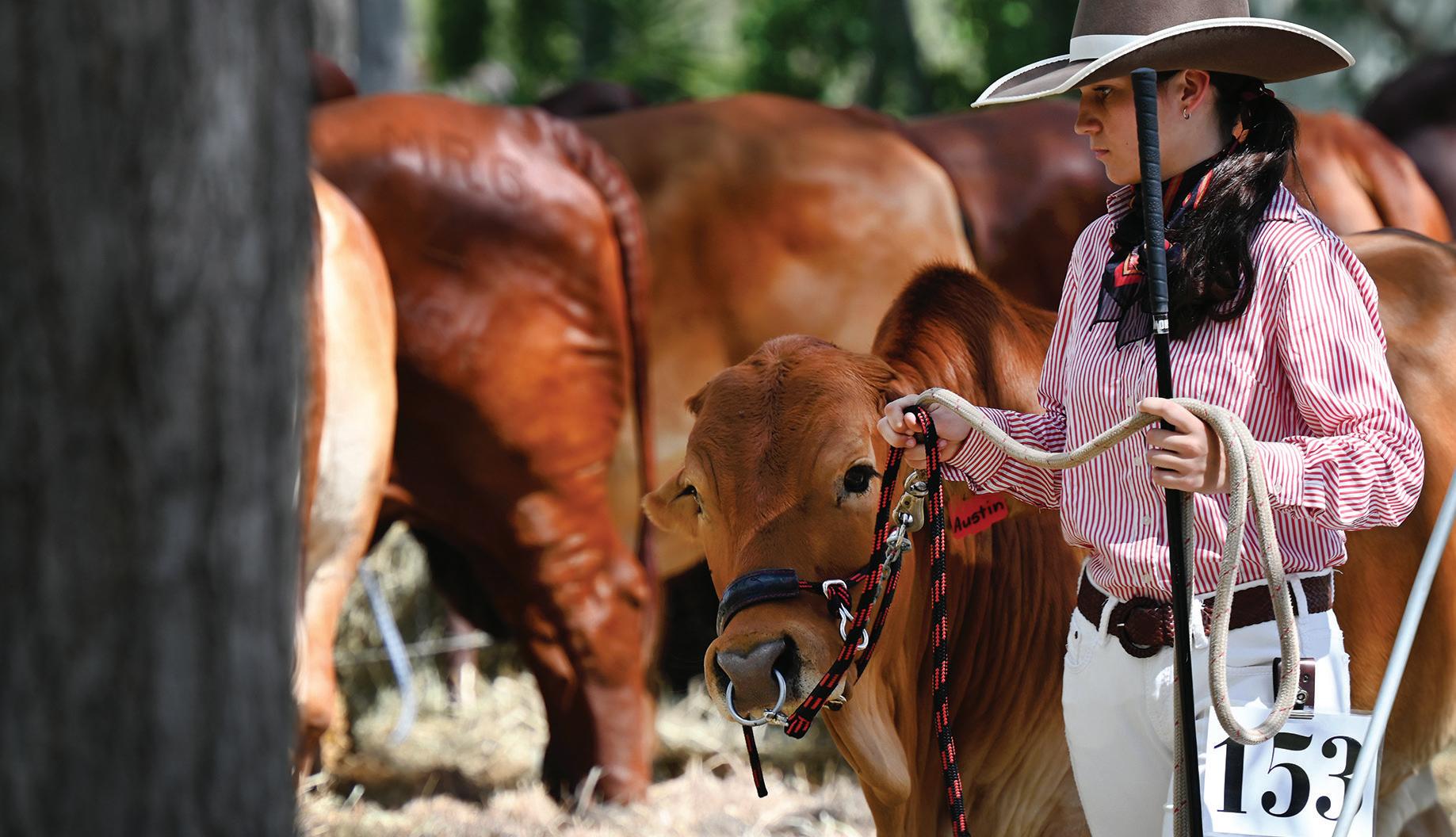
Show Time:
The hidden journey
While the clean, clipped coats, polished halters, and confident handlers in the ring might give the impression that showing cattle is simple and effortless, anyone involved knows it’s anything but. Behind every well-presented and well-behaved animal stands months of dedication, teamwork, and hard work. RGS Show Cattle
Teacher-In-Charge Miss Hannah Wiemers takes us on a journey behind the scenes.
This Show season has been both busy and successful for the RGS Show Team.
The season begins long before the first ribbon is awarded. From the start of Term 4 last year, students – a mix of seasoned handlers and new recruits – gather twice weekly to learn the ropes. Experienced team members assist coaches in mentoring the newcomers, passing on vital skills such as leading, grooming, and reading cattle behaviour. It’s about far more than looking polished in the ring; students develop life skills like patience, consistency, and responsibility. They also learn how to build trust and connection with animals larger than themselves – lessons that will stay with them long after they leave school and the RGS Show Team.
Cattle selection and early preparation are crucial stages. Choosing the right steers requires a trained eye to evaluate both structural soundness and temperament. Not every animal makes the final team that travels to shows. The halter training begins while the cattle are young. Through daily handling, washing, brushing, feeding, and leading, the
coaches, students and cattle become familiar with one another. Over time, the animals become more comfortable with human interaction and the busy environments they’ll face at shows.
Then there are the logistics – the often-unseen but essential backbone of any successful outing. Packing feed, tack boxes, grooming supplies, halters, first-aid kits, and camping equipment is a big job in itself. Coordinating transport for both cattle and students requires careful planning, attention to detail, and, occasionally, the ability to adapt quickly when things don’t go to plan. It’s a true team effort, where leadership and communication play a vital role.
Once at the showgrounds, the hard work continues. Students are up early – often before sunrise – to feed, water, and groom the cattle well before judging begins. Tasks are shared evenly among the team, with everyone pitching in to muck out, refill feed and water, and give the animals their final pre-ring polish. Then comes the big moments in the ring – the result of weeks, sometimes months, of preparation.
Whether competing in paraders’ and judges classes or presenting cattle in judging line-ups, students represent not just their animals, but also their School, their team, and the journey that brought them there.
One of the most memorable and rewarding parts of the show experience is the camping. Overnight stays at showgrounds foster a strong sense of camaraderie. Students and coaches cook meals together, reflect on the day’s achievements, and enjoy a few wellearned laughs around the fire, under the stars. It’s a unique blend of hard work, fun, and friendship – with plenty of stories to tell when they return home.
Being part of the RGS Show Team is about more than just ribbons and results. It’s about commitment, resilience, and learning through doing. It’s about early mornings, late nights, and supporting your team – both two and fourlegged alike. Most of all, it’s about pride: in the cattle, in the process, in the School and in what you accomplish together as a member of the RGS Show Cattle Team.
Boarding connections span across communities
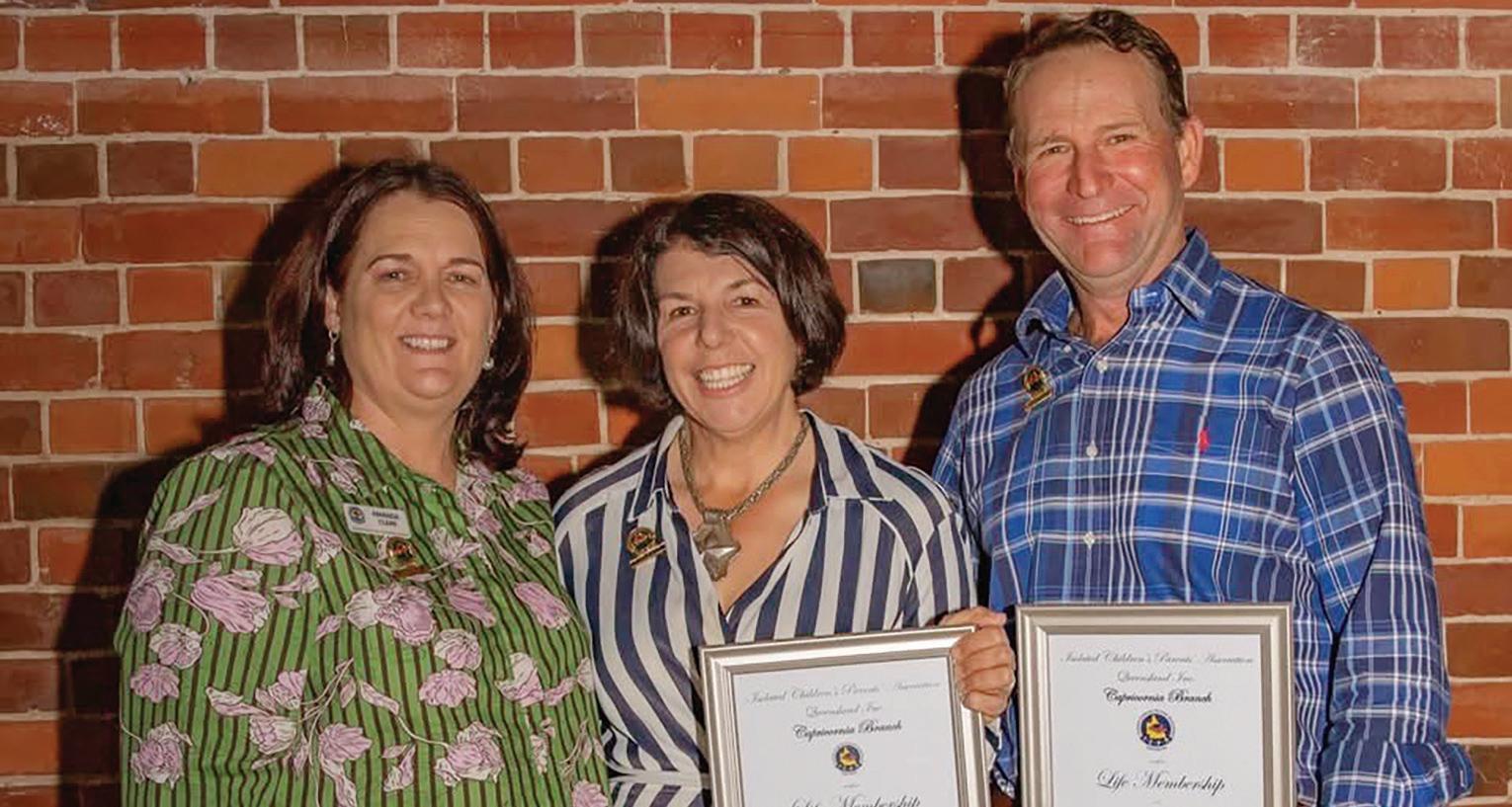
ICPA Life Membership – Ainsley and Rob McArthur
RGS Deputy to the Headmaster Mrs Donna Grant reflects on a deserved honour bestowed on RGS boarding parents:
At the recent “Bush Wisdom” 30-Year Celebration, the School was thrilled to see the presentation of Life Memberships to two exceptional members of our School community – Ainsley and Rob McArthur – in recognition of their outstanding contributions and unwavering dedication to the ICPA (Isolated Children’s Parents’ Association) Capricornia Branch.
For over two decades, the McArthur’s have been committed advocates for rural and remote education, generously giving their time and energy to support countless initiatives.
Ainsley has been a stalwart of the ICPA Capricornia Branch since 2001, including a remarkable nine-year tenure as President. She has attended 11 Conferences, led significant motions to benefit our members, and played a key role in a range of fundraising events.
Rob, too, has made an extraordinary impact, serving as a State Councillor for two years and dedicating 14 years to the Clermont ICPA Sports Camp in various roles – from camp carer and volunteer coordinator to Sports Camp Coordinator for four years.
Beyond their contributions to the Branch, Ainsley and Rob are known for their remarkable dedication to their family and broader community.
Together, they run a cattle grazing business at “Mystery Park,” west of St Lawrence, where they raise their six children and manage a
thriving, regenerative agricultural operation. Ainsley is passionate about promoting the realities and rewards of life on the land, and she shares this through her blog and social media channels, engaging with urban audiences and fostering greater understanding of rural life. Her advocacy is rooted in a deep belief that sustainable land management, animal welfare, and profitable farming can and should go hand in hand.
As if that weren’t enough, Ainsley and Rob are also marathon runners – a testament to their resilience, commitment, and remarkable energy.
Amid the many demands of family, work, and community service, they continue to wholeheartedly support their children’s wideranging pursuits and place great trust in The Rockhampton Grammar School as partners in their educational journey.
We are privileged to witness their downto-earth, loving approach to parenting and feel truly fortunate to have them as valued members of our School community.
Thank you, Ainsley and Rob, for your exceptional service, your generous hearts, and your inspiring example. Your Life Memberships are so richly deserved.
National Boarding Week at RGS – 2025!
National Boarding Week 2025 at RGS, offered an opportunity to shine a bright spotlight on the boarders, their families, and the entire boarding community.
The inaugural “Boarder Bash” kicked off the week, a community event co-hosted with Emmaus College, bringing together day and boarding families, Alumni, staff, and the Rockhampton community for a day of collaboration, spirit, and community.
The boarders hosted the Pancake Breakfast for the School, symbolising the warm and generous spirit of the boarding community, and featured at School assemblies. With a focus on this year’s theme, “Threads of Connection”, boarders Harry Chapman (Year 12) and Millie Burnett (Year 11) shared personal stories of their generational ties to the School, reflecting on walking the same halls as their parents and grandparents. This was followed by a lighter but equally insightful look into boarding life, through a “Day in the Life of a Boarder” video. An engaging and humorous presentation introduced by two of the School’s youngest boarders from the Primary School.
RGS also hosted the Central Queensland “hub” for the state-wide Student Boarding Leaders’ Forum. This concurrent event highlighted the leadership, vision, and voices of boarding students from across the State. Simultaneously, the boarding community enjoyed the inaugural “Dorm vs Dorm Talent Show”, an evening filled with laughter, creativity, and spirited competition. The standout winning performance was the Year 6–9 boys’ rendition of Piano Man. The week concluded with the “Taste of Country”, which transformed the Spaceframe into a rustic country barn, complete with BBQ brisket and a mechanical bull. A fitting finale to a week that celebrated every facet of boarding life –tradition, community, leadership, and joy.
National Boarding Week 2025 was a powerful reminder of the unique role boarding plays in the life of RGS, honouring the contributions of boarders past and present, fostered community spirit, and celebrated the connections that make Grammar Boarding not only a place to live and learn, but a place to belong.
Ainsley and Rob are pictured with ICPA State Vice President Amanda Clark. The Rockhampton Grammar School continues to be a strong supporter of the ICPA, with the School being a Gold Sponsor at this year’s ICPA State Conference in St George.
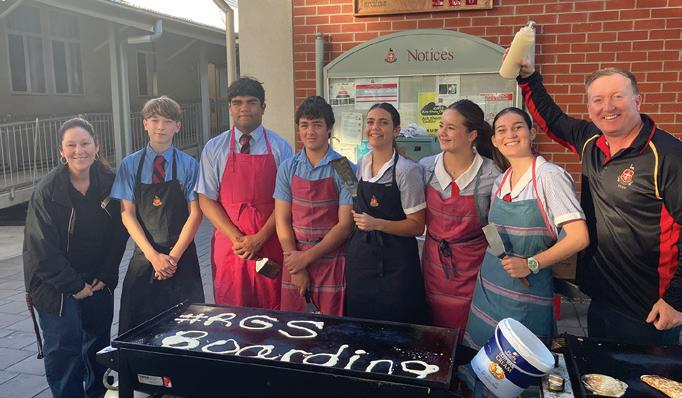
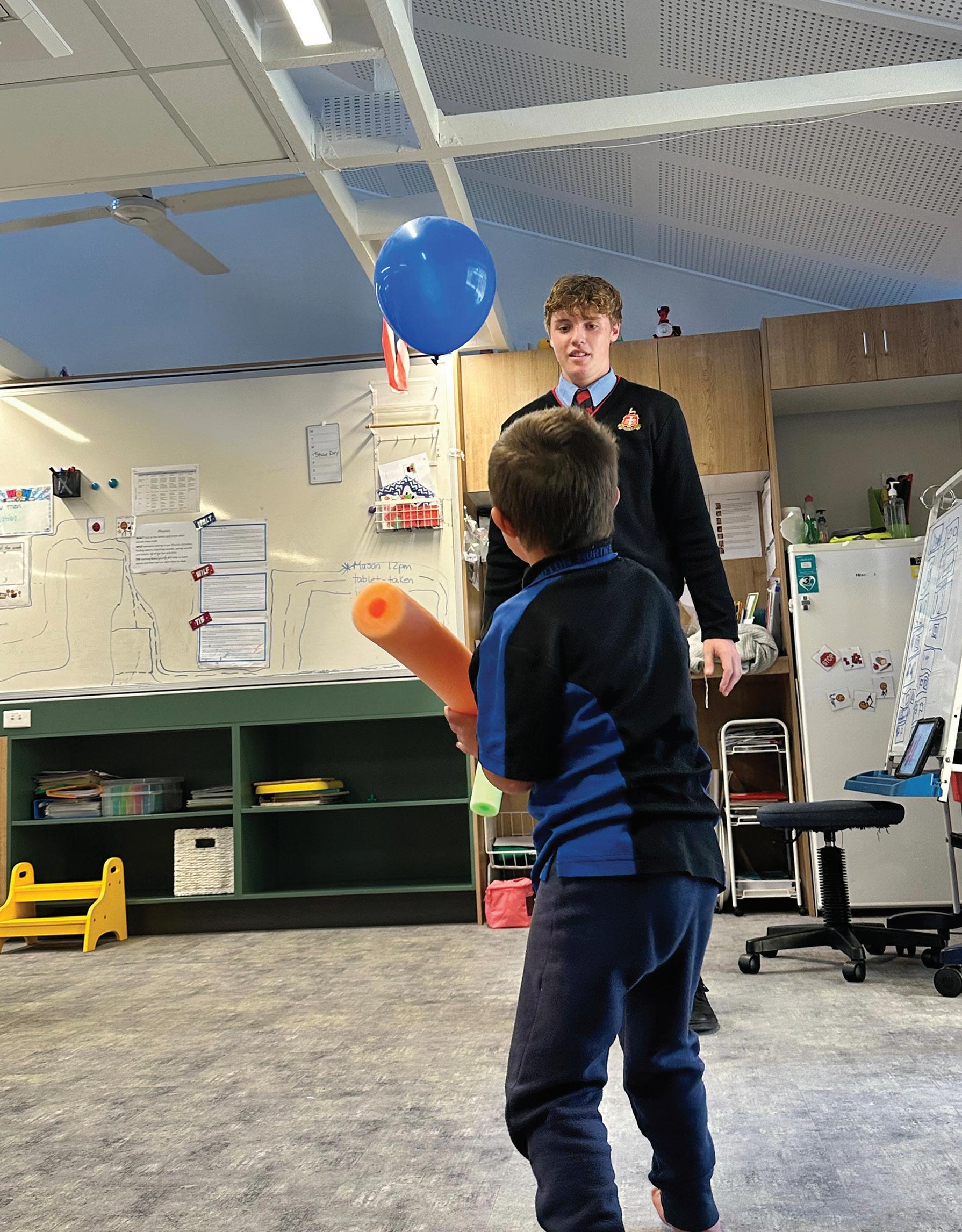
School visits create caring communities
For the past two years, RGS Head of Leadership Mr Kyle Langman has coordinated visits between RGS and Rockhampton North Special School students. It’s all about building bonds beyond the classroom. Mr Langman provides an insight into a special bond that has formed this year between RGS Year 12 student Riley McDonald and his new friend Hud.
In our school community, we know how important it is for students from different backgrounds to build real, meaningful connections. For over two years, students from The Rockhampton Grammar School have been visiting Rockhampton North Special School, creating friendships that help everyone feel included and valued. One great example of this is the friendship forming between Riley, a Prefect at RGS, and Hud, a young student at North Rockhampton Special School.
A teacher at Rockhampton North Special School mentioned how Hud was hesitant at first: “Hud didn’t want to move until he saw Riley was coming into our room. As soon as Riley arrived, Hud’s guard dropped, and they
got stuck into all sorts of ball games. Right now, they’re having a go at kippy-uppy with a balloon. I reckon Hud’s winning,’’ they said.
Both boys love ball sports like cricket, but more than that, it’s the warmth, laughter, and trust they’re building that really makes the friendship special.
Riley reflected on how the friendship started: “When I first came here, they had parade –which is like their assembly. The first time I visited, young Hud came into the room and was sort of mucking around a bit, but I saw him and started to take him under my wing. We spent the afternoon playing games in his classroom, and now every time I come back, Hud is always there running over to see me.
“By showing kindness and patience, they remind us that everyone benefits when we support each other.”
Honestly, it’s pretty special – it makes my day seeing everyone’s smiles, meeting new people, and making new friends.”
Riley said these moments weren’t just about playing – they were about forming real connections that make a difference.
Hud, who you could describe as “a fun little guy,” mostly shows what he thinks through actions and tone, rather than words.
Hud’s teacher said he doesn’t say much, so he expresses himself through what he does.
Riley’s kind, patient approach is a great example of leadership through service –showing kindness, patience, and support. When Hud looks out for Riley during the RGS visit, it shows just how much their friendship is growing – beyond just the fun, it’s about caring for each other.
These sorts of interactions are really good for all Rockhampton North Special School students.
“Our students probably don’t get out into the wider community very much so any chance they get to build relationships outside of staff, or their usual classmates, is so valuable,’’ Hud’s teacher said.
These moments give them the chance to see the wider world, develop empathy, and learn how simple acts of kindness can have a huge impact.
The friendship between Riley and Hud really highlights how leadership – especially leadership through being kind and supporting others – can change lives. Acts of caring and support create ripples of positivity that stretch well beyond the classroom. Their bond is a reminder that small gestures of kindness can make a big difference and can help make our community more welcoming and inclusive.
Since that first meeting, Riley and Hud have built a friendship that shows us all what true leadership looks like, caring for others and making connections that last. By showing kindness and patience, they remind us that everyone benefits when we support each other. These simple acts of service help create a stronger, more caring community where everyone has the chance to grow and feel valued.
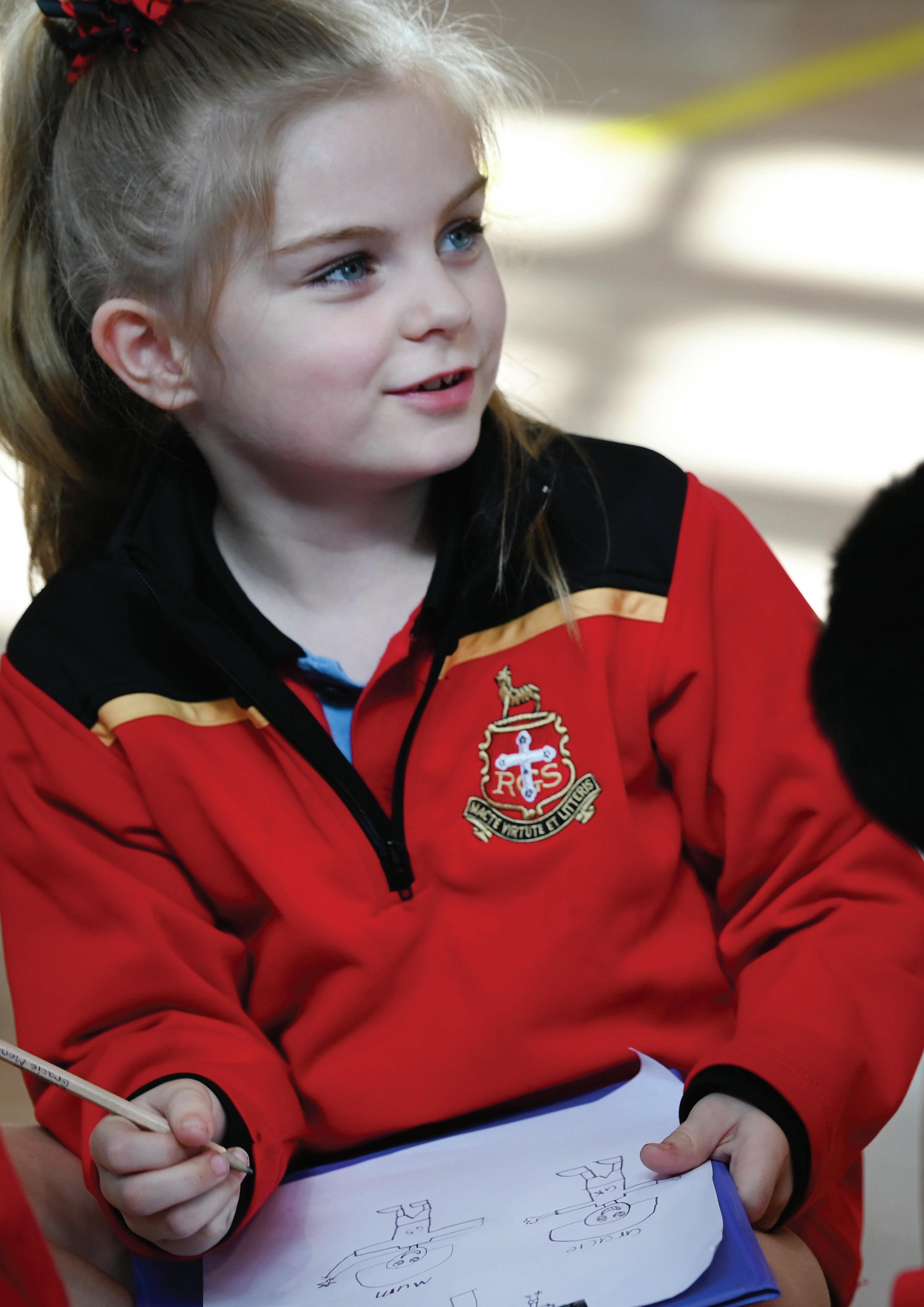
CREATIVITY
INSPIRATIONAL IDEAS
Dr Cameron Stelzer was a self-described “manic” writer in his Primary School years. His passion for creative writing still remains strong. Dr Stelzer is now one of Australia’s favorite children’s authors, having written and illustrated over 36 books, including the internationally award-winning Pie Rats series, the fun and zany Scallywags series, the SOS series for younger readers, how-to-draw publications and the Stroogle picture book series. In Term 2, Dr Stelzer provided some writing and drawing inspiration for the School’s Primary students.
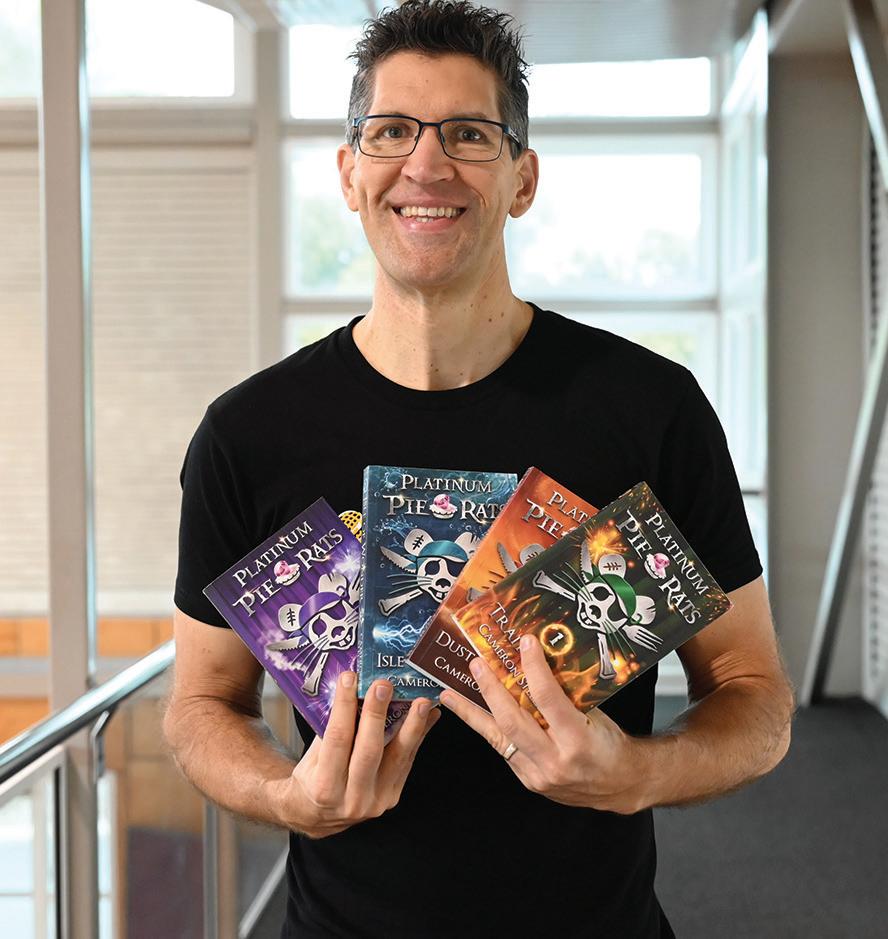
Creative writing can open a door to a different world, just through the use of some exciting and descriptive words.
Australian children’s author Dr Cameron Stelzer visited RGS Primary during Term 2, hosting workshops on exciting descriptive writing and inspirational ideas – with some fun illustrations along the way.
“A simple sentence like – I went to the beach – can be edited to –I was so excited because I ventured onto the soft warm sand,’’ Dr Stelzer said.
“The difference between those two sentences is you’re doing the same thing but suddenly you’re putting some adjectives in and using some more exciting language. You can start with the most boring story and by bumping up your vocabulary, it is suddenly an exciting process.”
Dr Stelzer said practice was the key to enjoying writing.
“Look for strategies in writing and applying those. It’s like on the sporting field. If you learn a new drill at training and keep practicing that drill, it becomes something more natural. Always apply knowledge.”
Dr Stelzer said there will always be “reluctant” writers in the world.
“It’s finished and I’m happy with it. But ask yourself, ‘what could I do to improve it? Other children never know when to stop. Literally you could keep writing forever. There’s always something you could change. Some children have to find a spot where they are comfortable with what they have. It’s not like a maths equation with a final answer.”
Dr Stelzer said for some people who might struggle more with writing, it’s about asking them questions.
“What about this experience? What do you enjoy? Sometimes you can look at a student’s pencil case for ideas on what they are interested in. It might be a unicorn you can ask them more about or the Gold Coast Suns, tell me about one of your favourite players,’’ he said.
“Often children don’t realise they probably have the answers already and in terms of their memory and imagination, it’s just tapping into that.”
Dr Stelzer is still proud of his first book he wrote in Year 4.
“Often children don’t realise they probably have the answers already and in terms of their memory and imagination, it’s just tapping into that.”
Dr Cameron Stelzer is one of Australia’s favourite children’s authors.
“We made these stories and then technically had them published. They would be typed up, we would draw the pictures and put some staples into it and there was the finished book. My book was a space adventure. As you go through the story the pictures get worse and worse. You can see I’m running out of puff and I’ll scribble a bit more. Wanting to finish the story is often the hardest.”
He published his first children’s book in 2004 and has now published 36 books, and with each new book comes new challenges.
“It’s a journey. The key is to start the next book before you finish the one before. You’re generating those new ideas before you have that lull after you finish a book. Then you can jump into the next book straight away,’’ Dr Stelzer said.
“I’m good at getting ideas but it’s trying to consolidate them all together into something unique. The more books you create, the more you have to make sure you’re not replicating something you have done before –finding different animals or different problems to solve.”
Dr Stelzer is both an author and illustrator and admits he does not prefer one over the other.
“I like being able to both write and illustrate. My illustrations might take on their own life so I can go back and change the text. I’ve changed characters before based on something in a picture I’ve drawn. You can change the script more doing both,’’ Dr Stelzer said.
RGS Head of Primary Mrs Kate Harris was thankful for Dr Stelzer’s workshops which were not simply about writing for a task, but also about discovering the joy of creating, imagining, and playing with ideas, just for the love of learning.
“At the heart of Dr Stelzer’s visit was a powerful message: writing is not just something we do at school – it’s something we can love,’’ Mrs Harris said.
“His workshops reminded us that imagination is a skill worth nurturing, and that storytelling is a way of expressing ourselves, connecting with others, and exploring the world around us.”
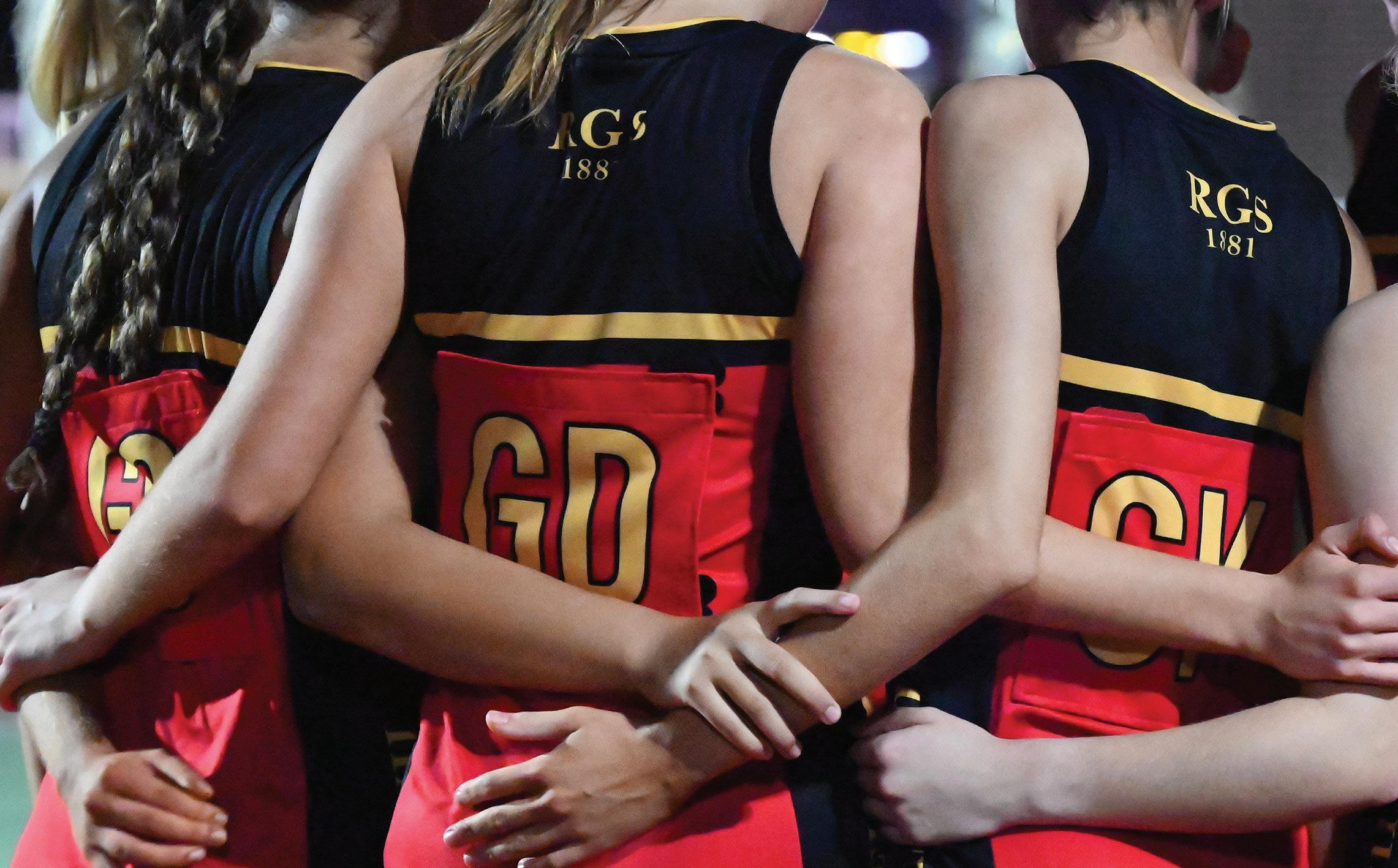
Strategies supporting student wellbeing
RGS School Clinical Psychologist Mrs Rosie van der Loos is at the forefront of supporting student wellbeing- identifying four key strategies to building emotional boundaries and positive habits while at the same time supporting the wider school community building the emotional tools they need to thrive.
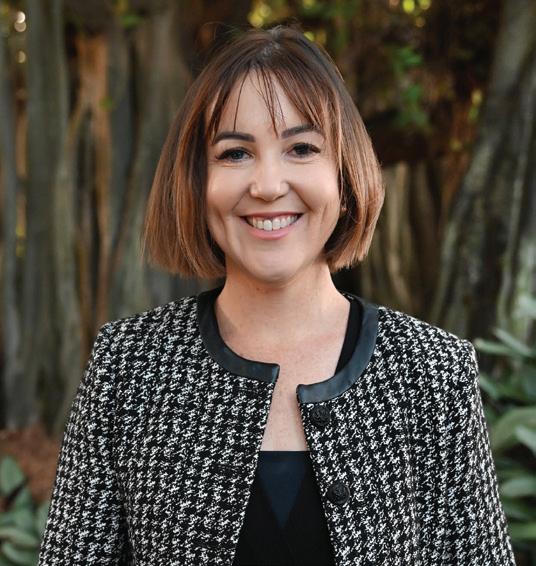
Working in a school setting is one of the most rewarding elements of my work. Both my colleague Alicia Casey and I regularly present to Year 9s as part of the “What About Me” programme as well as whole cohort presentations to Year 11 and 12 students. Our students come from a rich tapestry of backgrounds – rural, remote, regional, and international – and while their journeys are unique, the need for emotional and psychological wellbeing is universal. Recently, I had the opportunity to share with staff a practical framework for supporting their own wellbeing through emotional boundaries, habit formation, and the PERMAH model through their professional development programme.
Here are four key takeaways for nurturing your family’s wellbeing, drawn from evidence-based psychological theories and models.
1. Prioritise the Pillars of Wellbeing (PERMAH)
Psychologist Martin Seligman’s PERMAH model highlights six core elements of wellbeing:
• Positive Emotions
• Engagement
• Relationships
• Meaning
• Accomplishment
• Health
Model this yourself and lead by example –encourage your family to pursue activities that light them up (positive emotions), develop flow states and connection with what they are doing (engagement), foster meaningful and enriching social connections (not electronically), and contribute to something bigger than themselves. Foundational to wellbeing is adequate sleep, good nutrition, and regular movement (contributing to the health).
Rosie van der Loos
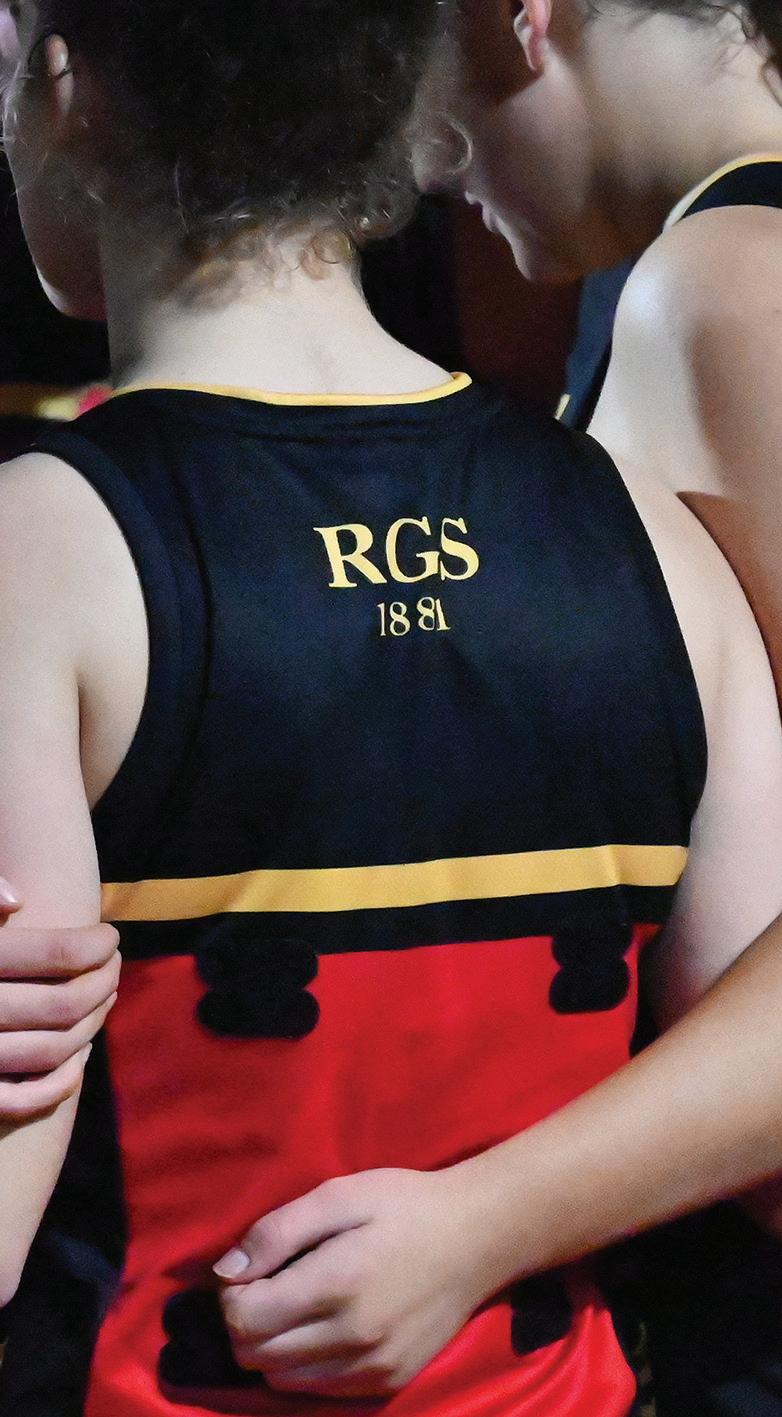
Individually we are all different, but by coming together we form a supportive group.
WANT TO LEARN MORE?
Here are some resources for deeper insight:
• Flourish –Martin Seligman
• Atomic Habits –James Clear
• Your Future Self –Hal Hershfield
• Mel Robbins podcast: “The Let Them Theory”
“In our busy, fast-paced lives, it’s easy to get caught in time confetti – tiny fragments of distraction.”
2. Teach Healthy Emotional Boundaries
Children and teens often struggle to separate their own internal world from the feelings of others (it’s hard as adults as well!). Teaching emotional boundaries helps them recognise what they can and cannot control. For example, if a friend is in a bad mood – that is beyond their control, all they can do is offer kindness/ space /an empathetic ear – but your child doesn’t have to absorb that emotion as their responsibility.
Boundaries conserve emotional energy and empathy. We can model healthy emotional boundaries by limiting how much our work interrupts home life, using assertive communication by respectfully saying “no” rather than “yes” to everything, or by demonstrating how to remove yourself from emotional ‘drama’ in your own life. The Let Them Theory, popularised by therapist Mel Robbins, encourages letting others take responsibility for their actions and emotions. This essentially draws a line between what is
within and outside of our control. Rather than rescuing your child from every discomfort or conflict, you can let them navigate challenges with your guidance and emotional support.
3. Small Habits = Big Change
James Clear’s concept of atomic habits reminds us that tiny, consistent actions lead to meaningful results. Encourage your child to start with small, achievable habits – like five minutes of journaling, five push-ups, or one minute of mindfulness.
Most importantly, tie these habits to identity: “I’m the kind of person who looks after my wellbeing.” This identity-based motivation is more powerful than external rewards.
4. Connect With Their Future Self
Research shows that those who regularly imagine their future self – who they want to be in 5 or 10 years – are more motivated to make good choices now. This “mental time travel” creates an emotional bridge that helps
make studying, saving, or saying “no” to peer pressure more meaningful. As adults, we can apply this to our own lives by prioritising physical health and wellbeing whilst juggling everything else.
You can support this by asking questions like, “What would your future self thank you for?” or “If your future self wrote you a letter, what would it say?”
Final Thought:
In our busy, fast-paced lives, it’s easy to get caught in time confetti – tiny fragments of distraction or ‘multi-tasking’ that scatter our attention and fragment our time – we can avoid this by completing tasks individually with our undivided attention. This is a far more efficient method, as we are not wasting time switching our attention between tasks. Helping your child reclaim meaningful moments, set boundaries, and build micro-habits can create powerful momentum for lifelong wellbeing.
Football Premierships
RGS Secondary School football teams savoured grand final glory at St Brendan’s College. The Year 11/12 boys defeated SBC 1-0, after a late goal to Spencer Besch, while the Year 9/10 team produced a 2-1 win over SBC after goals to Jude Smart and Sai Guatam. The inter-school girls football kicks off in Term 3.
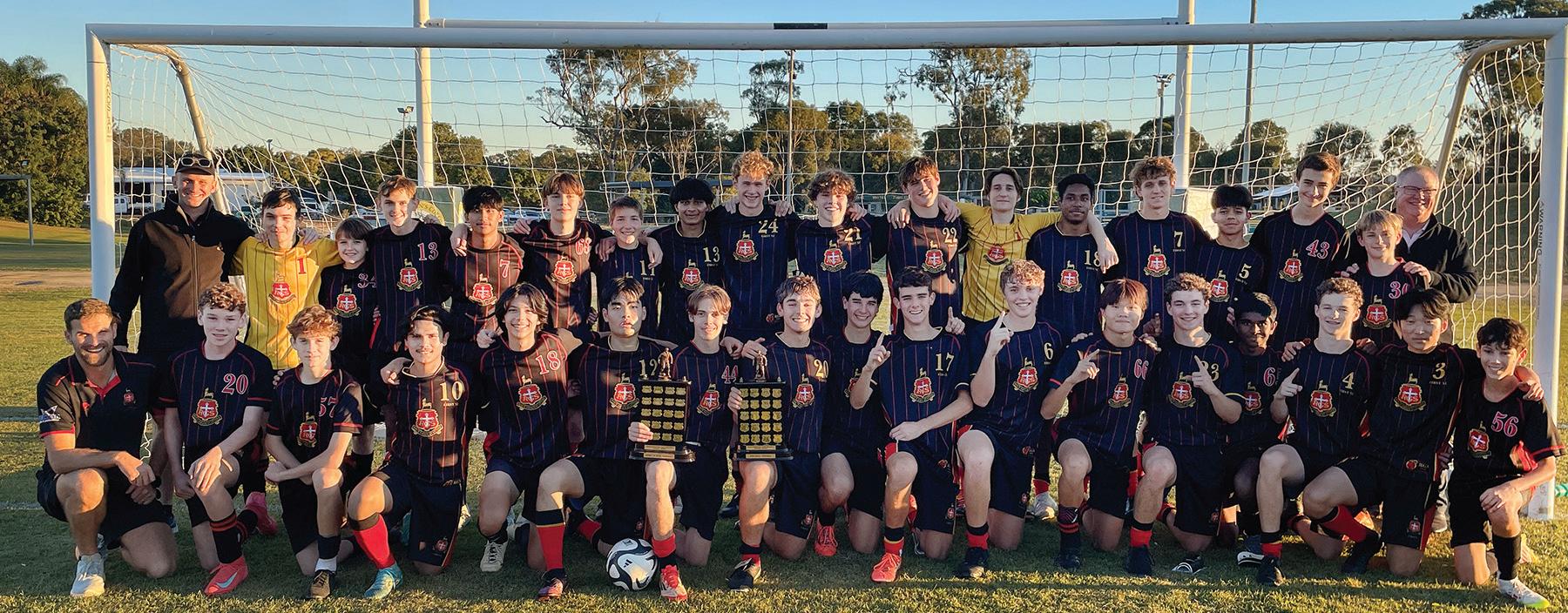
Schoolgirls League
RGS schoolgirls rugby league teams hit the field in Term 2.
The RGS Year 7/8 team and the Year 11/12 team both qualified for the Rockhampton District Secondary Schools Rugby League schoolgirls grand finals RGS Rugby Park.
After both teams produced competitive first halves, they both finished runners-up to teams from The Cathedral College. Year 7/8 player of the final was Evie Francis (pictured) while the Year 11/12 player of the final was Offiliah Chippendale.
The RGS First XIII girls team also started their Dolphin’s Cup Schoolgirls campaign, along with the Boys Cup and Challenge teams, that continue in Term 3.
The league games followed the Term 1 rugby union season.
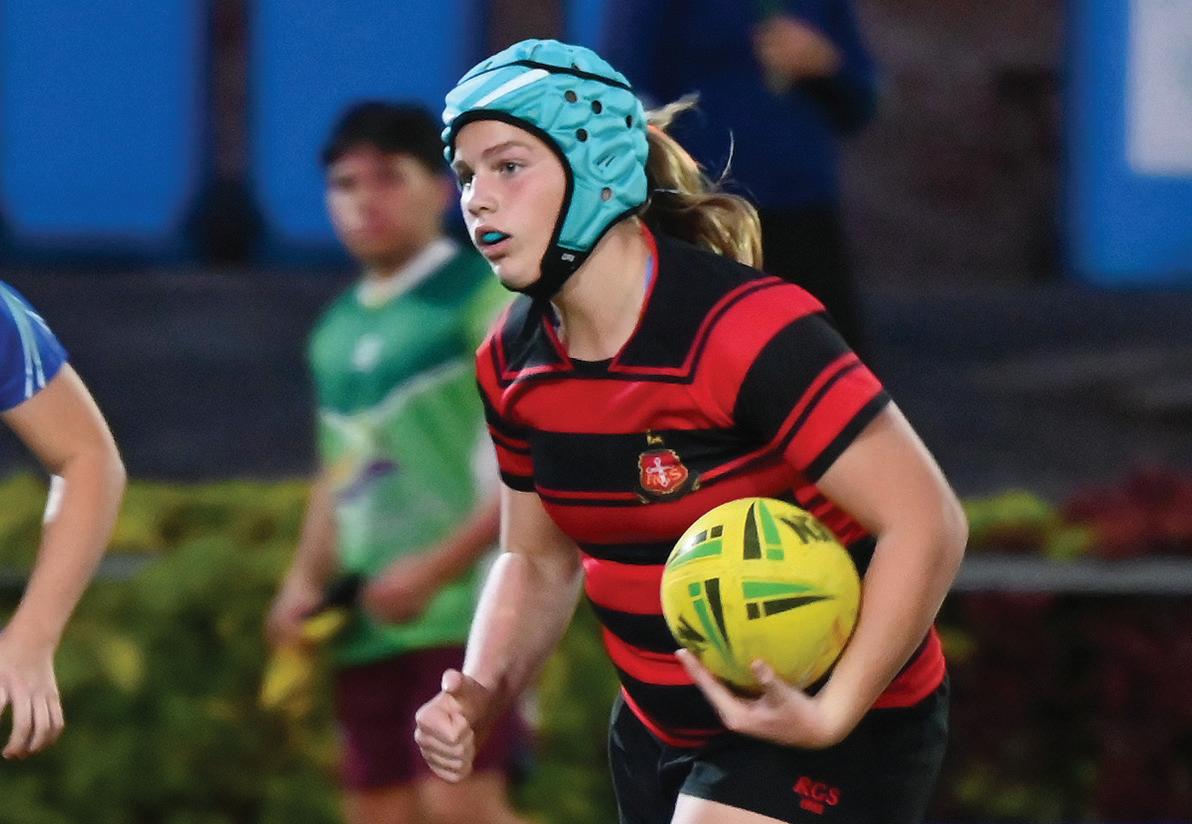
AROUND THE GROUNDS
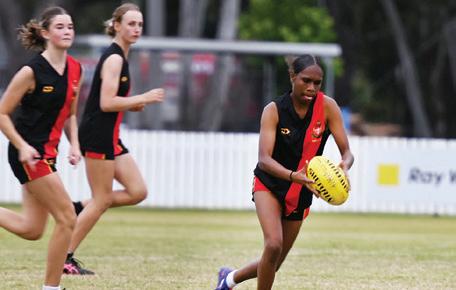
AFL
The inter-school Secondary Schools AFL season wrapped up in Term 2 with the RGS Year 9/10 girls team finishing runners-up in their Rockhampton District final against TCC. Earlier in the term, RGS fielded three boys teams (Year 7/8, Year 9/10, Year 11/12) teams in gala days with the Year 7/8 and Year 11/12 teams finishing runnersup in their divisions.
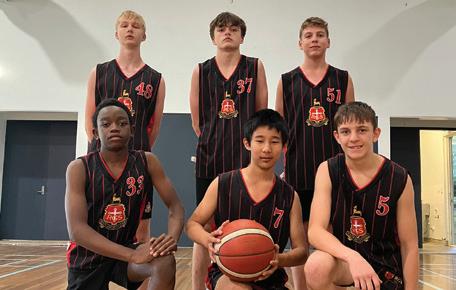
BASKETBALL
The RGS Year 7/8 boys team finished runners-up in the Junior A division after a 50-42 loss against Emmaus College. RGS trailed by 14 early in the 1st half before taking the lead in the 2nd half, despite having only 6 players dressed for the game. The team’s only losses in the season were against Emmaus. RGS MVP of the final was Year 8 student Valentino Cook.
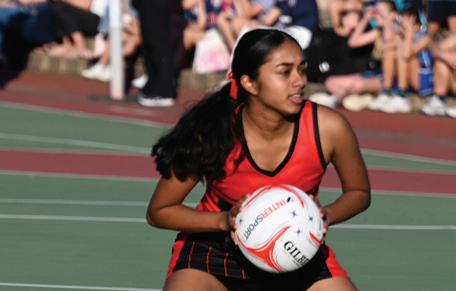
NETBALL
The Rockhampton District Schoolgirls finals were played in Term 2 with RGS teams – Bullets (Open D), Lakers (Open E) and Thunder (10B) winning their finals. Runners-up were Magic (Open A), Meteors (Open B), Celtics (Open C), and Dodgers (7B). RNA games continue in Term 3. RGS also entered a boys netball team in an inter-school competition with the RGS boys undefeated across six games.
Primary Athletics
Champions
6
11
11
12
12
Secondary Athletics
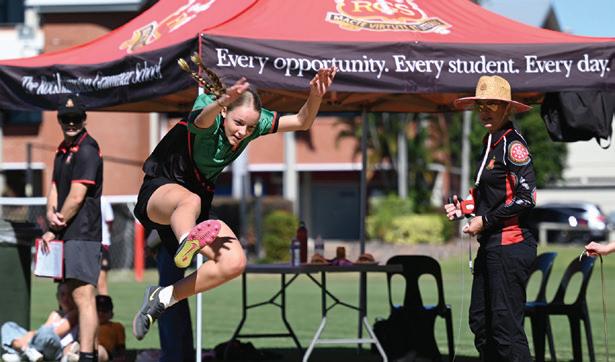
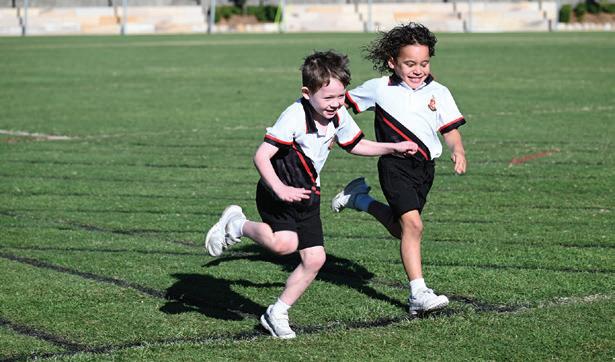
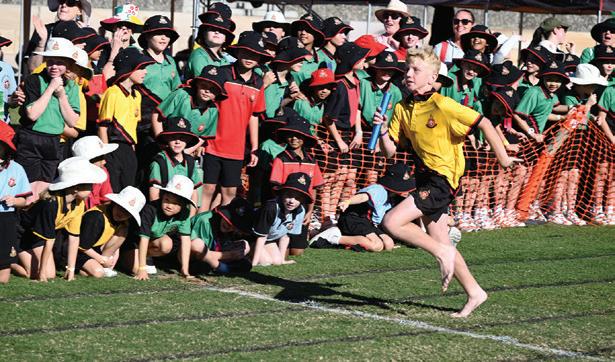
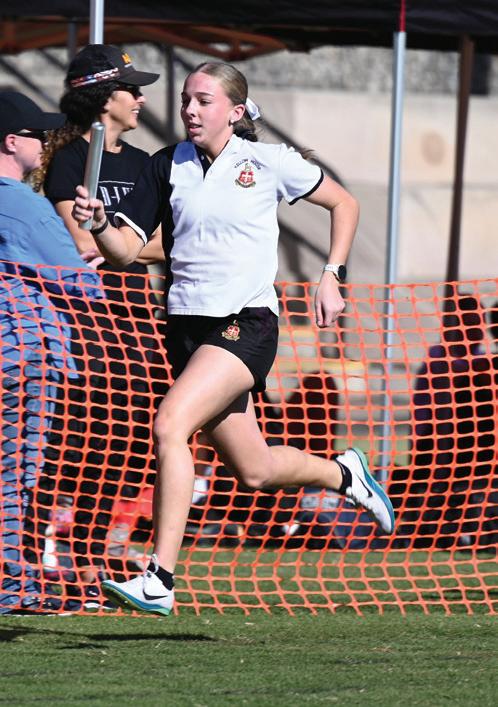
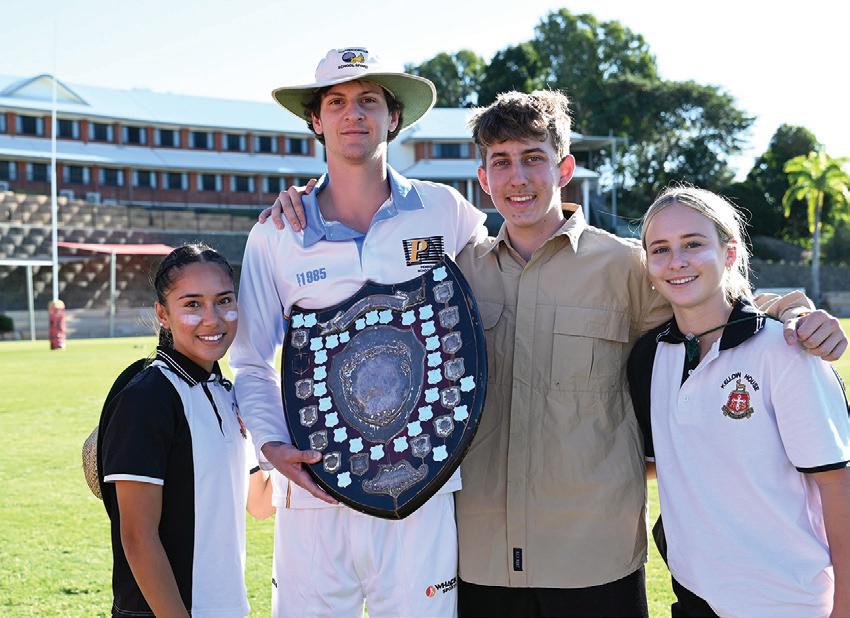
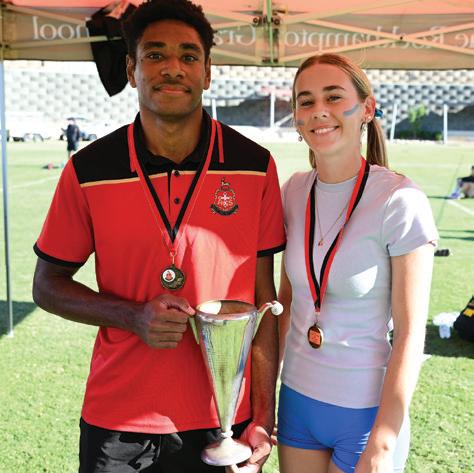
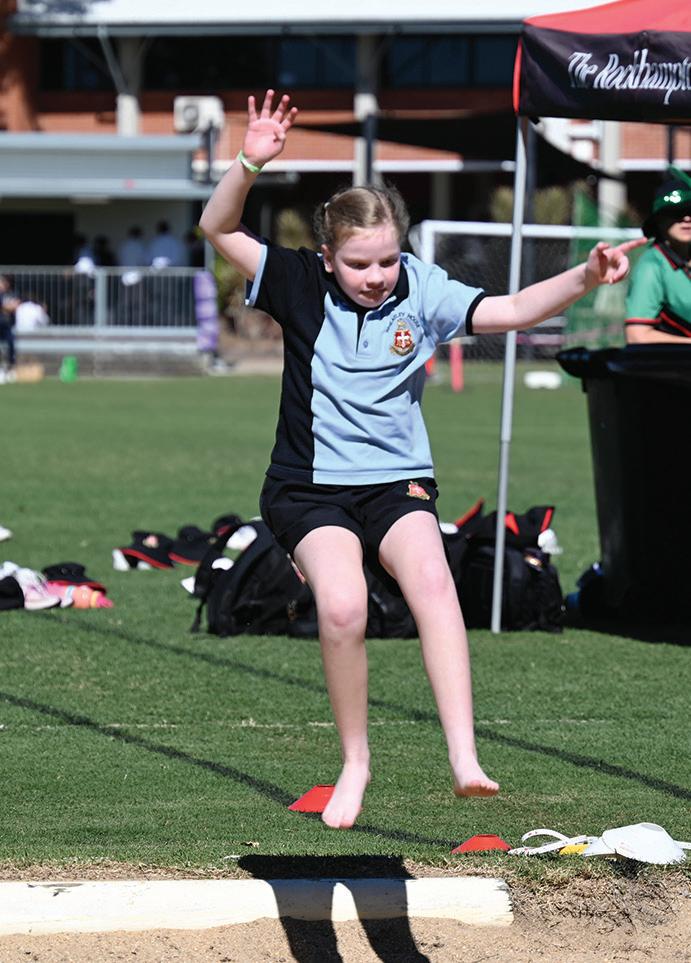
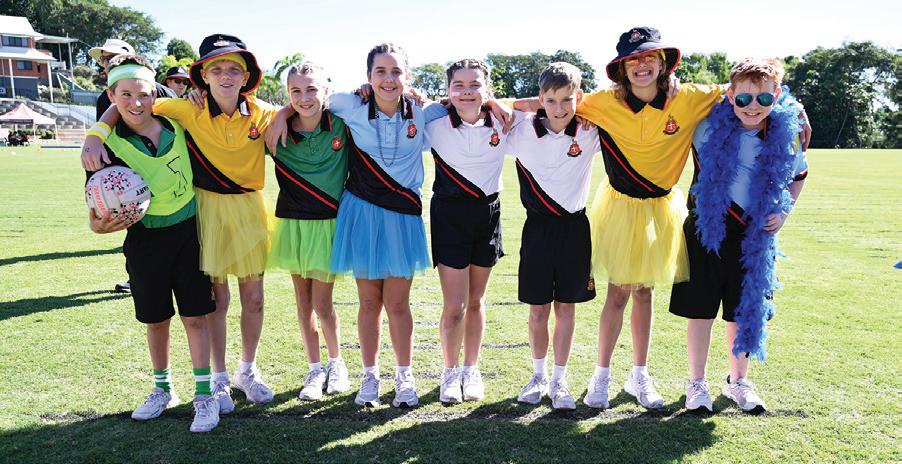
16
Open
Sprint
Sprint
Secondary
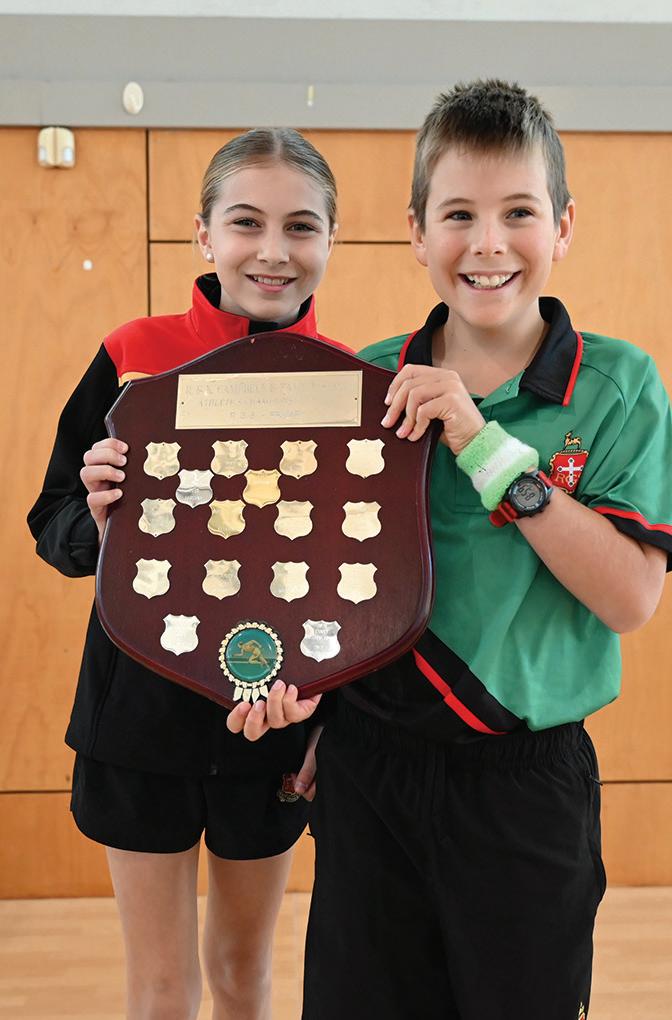
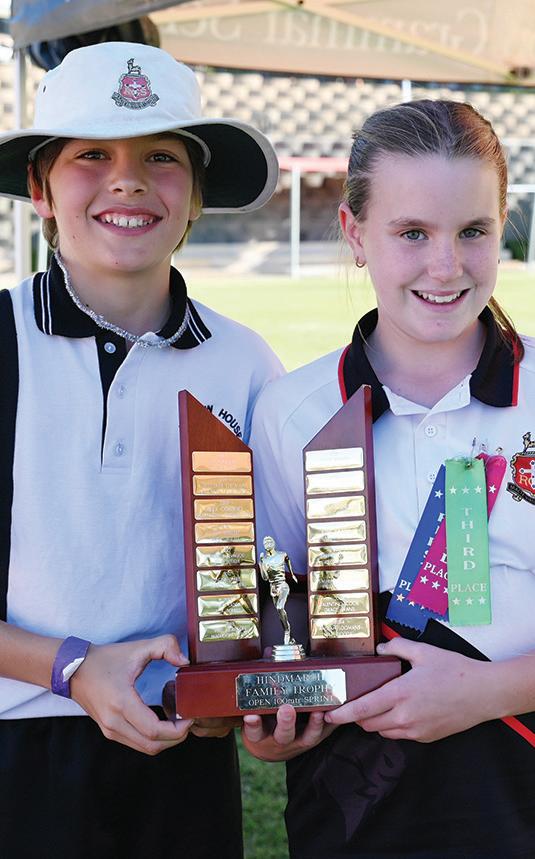
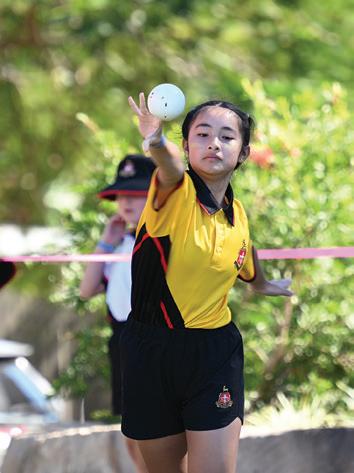
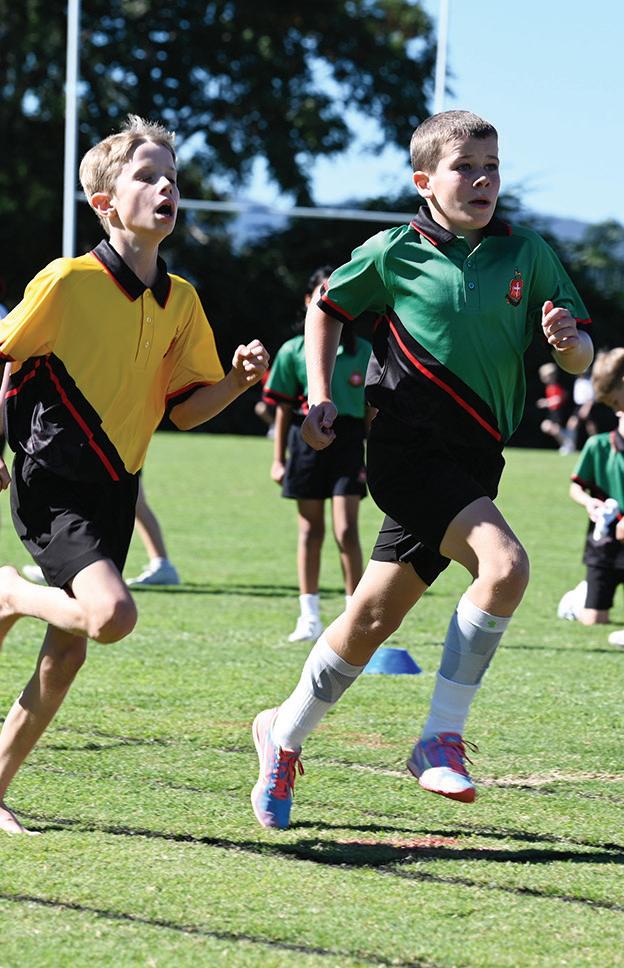
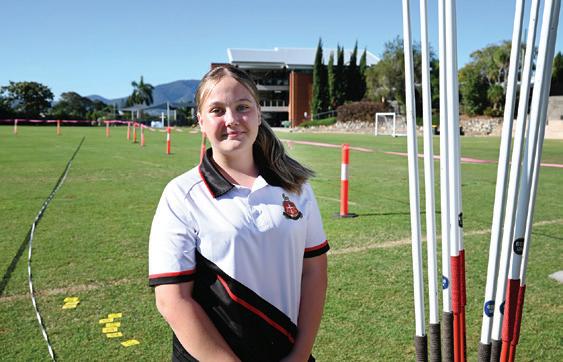
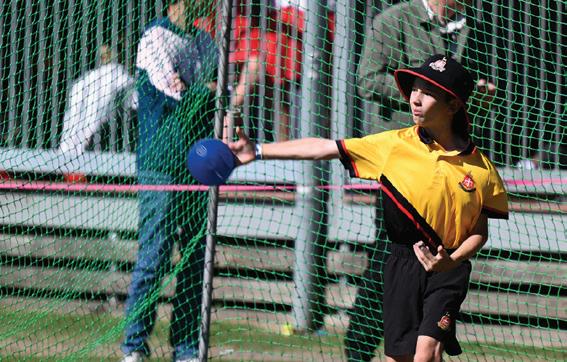
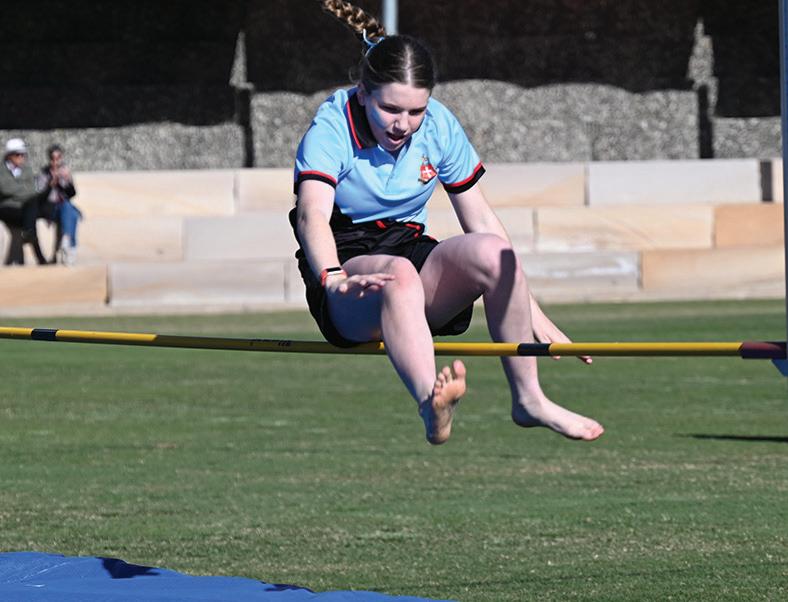
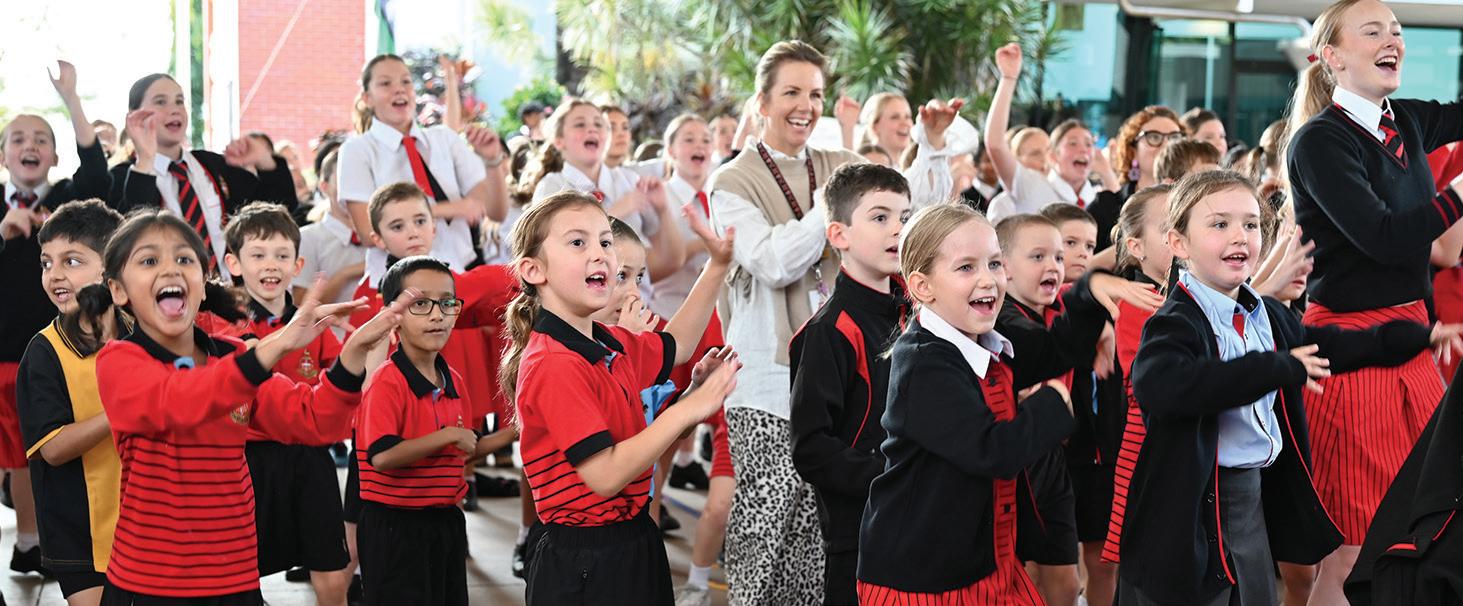
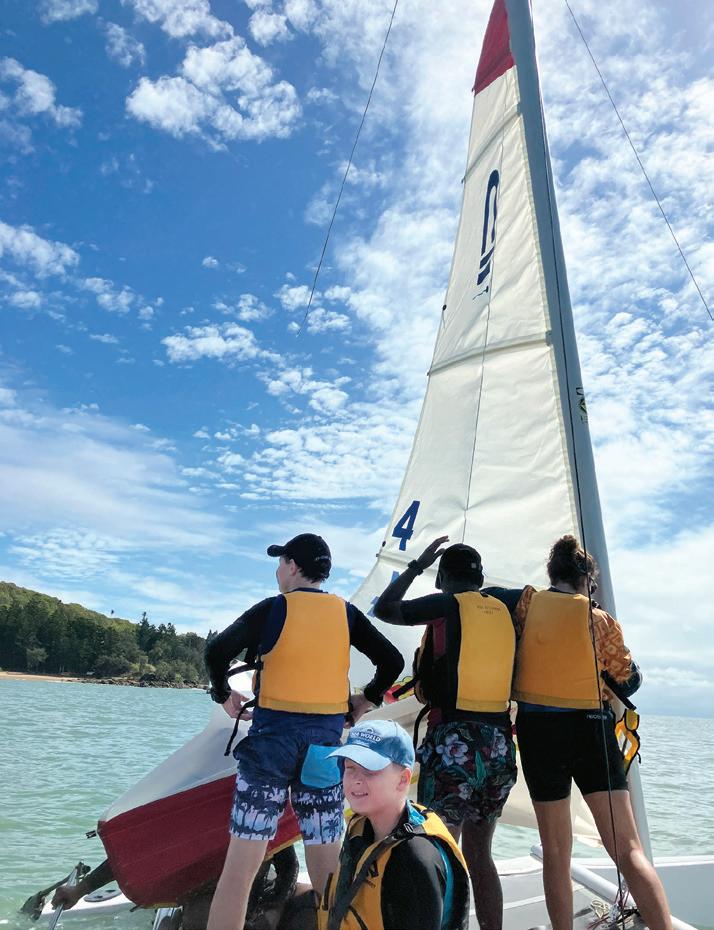
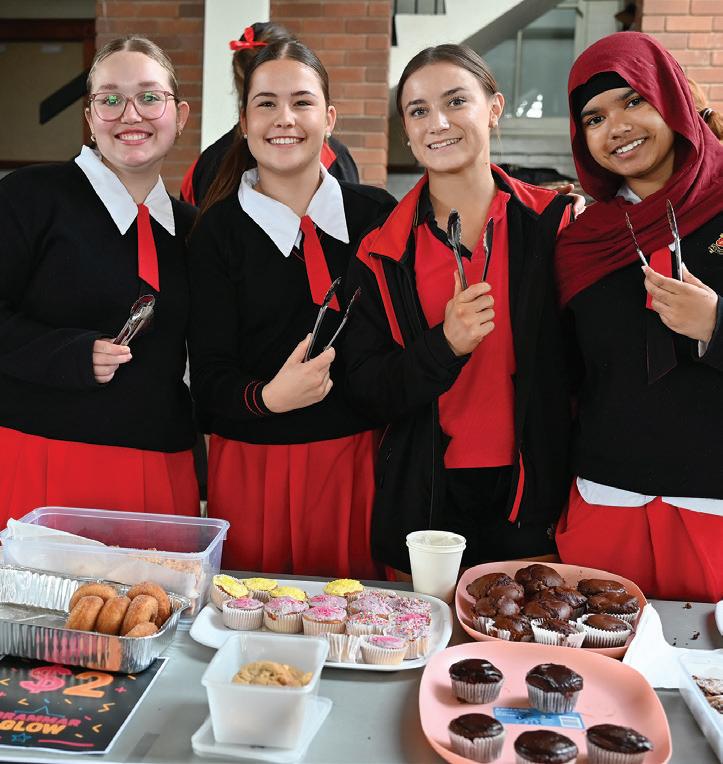
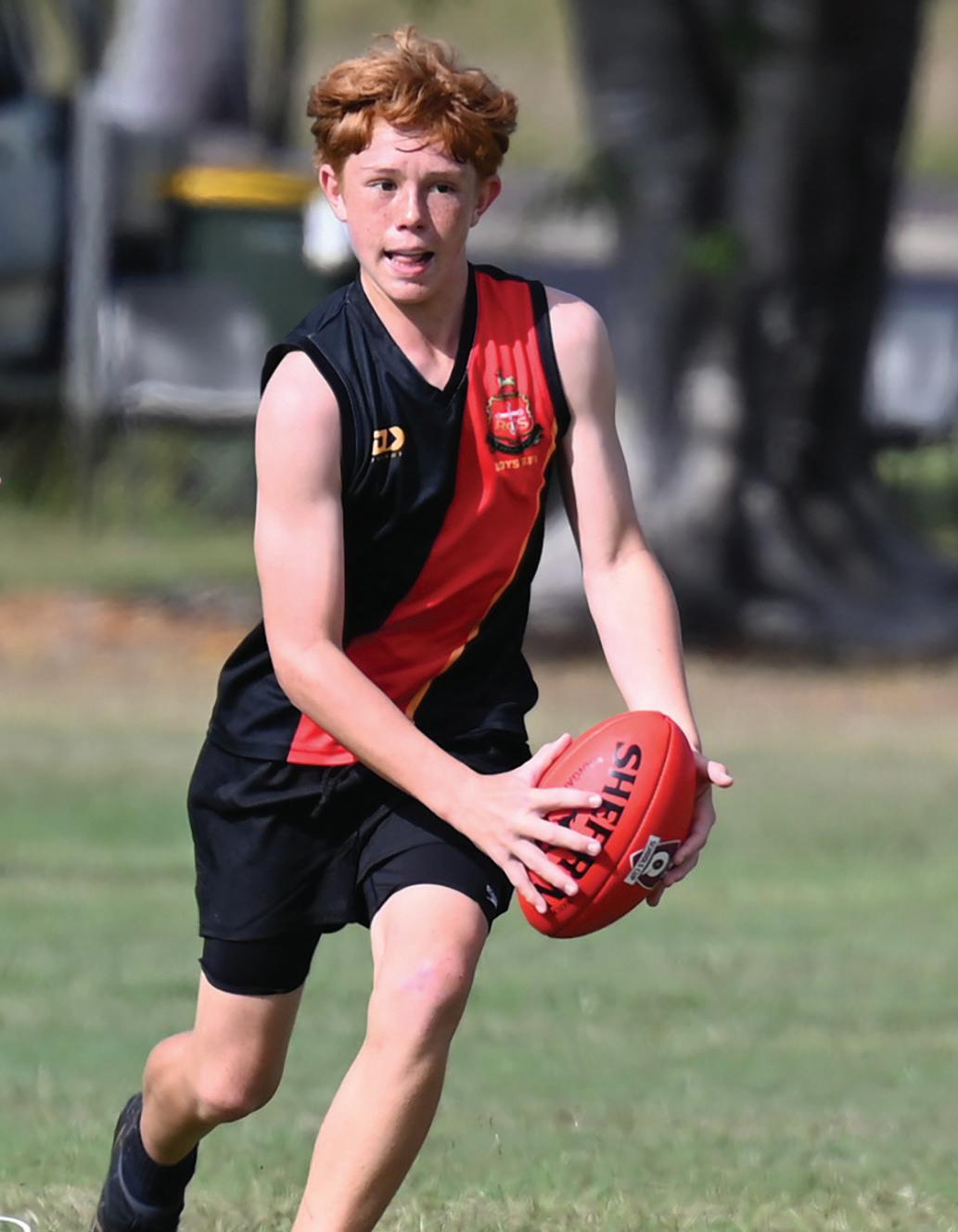
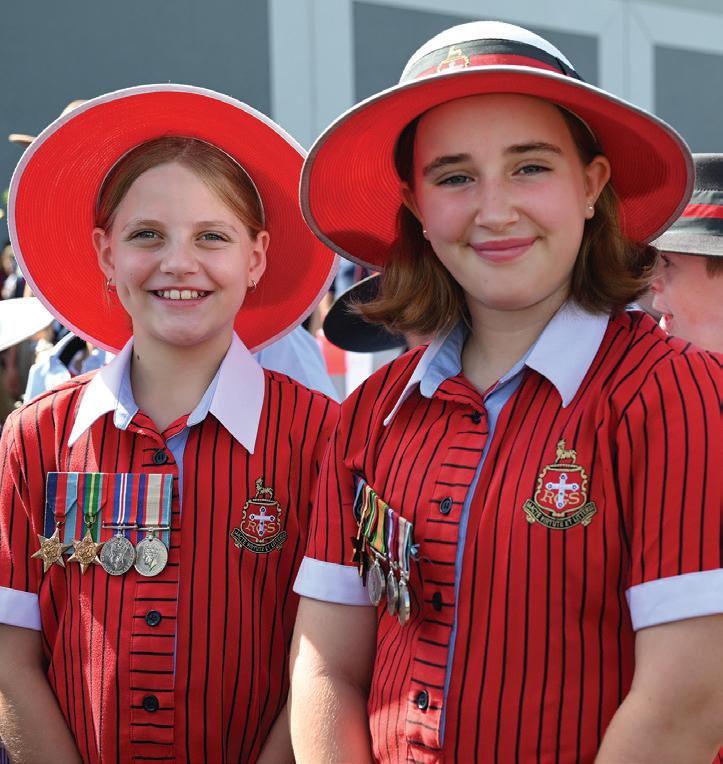
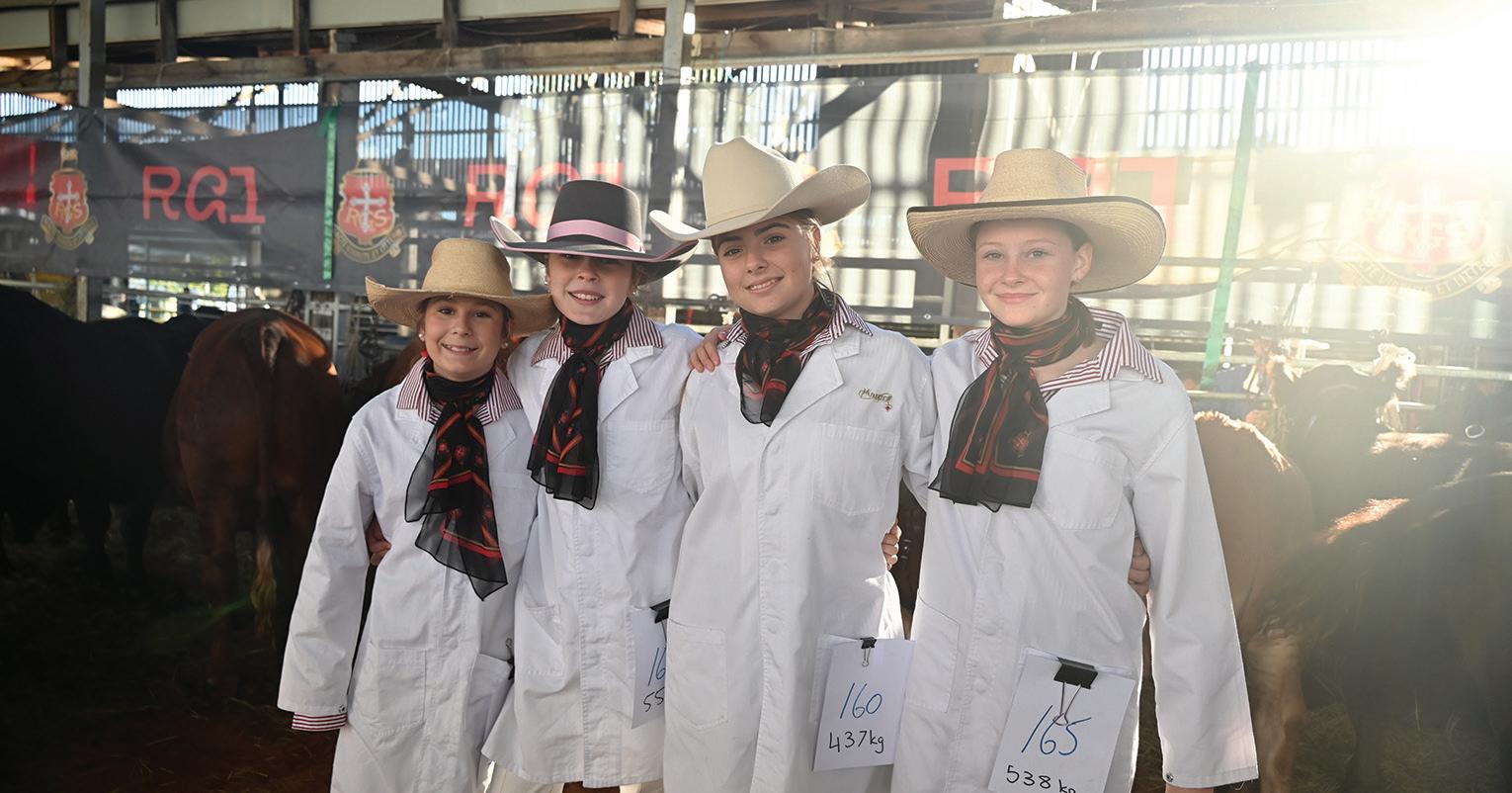
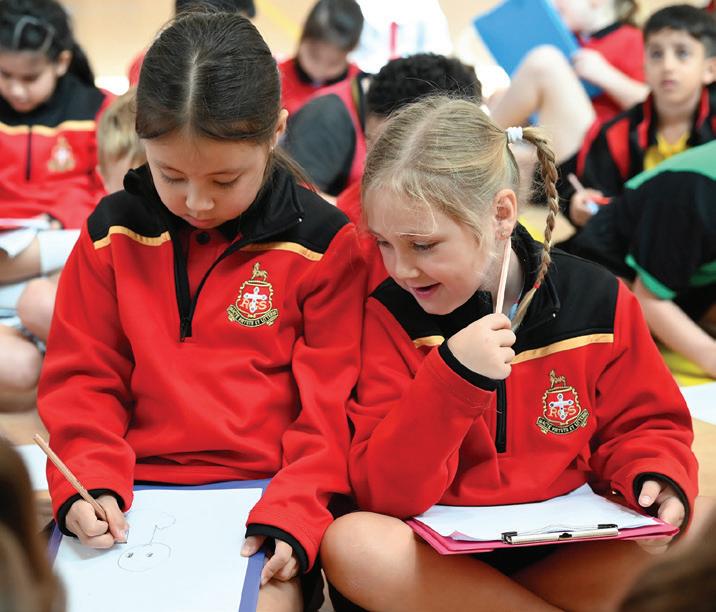
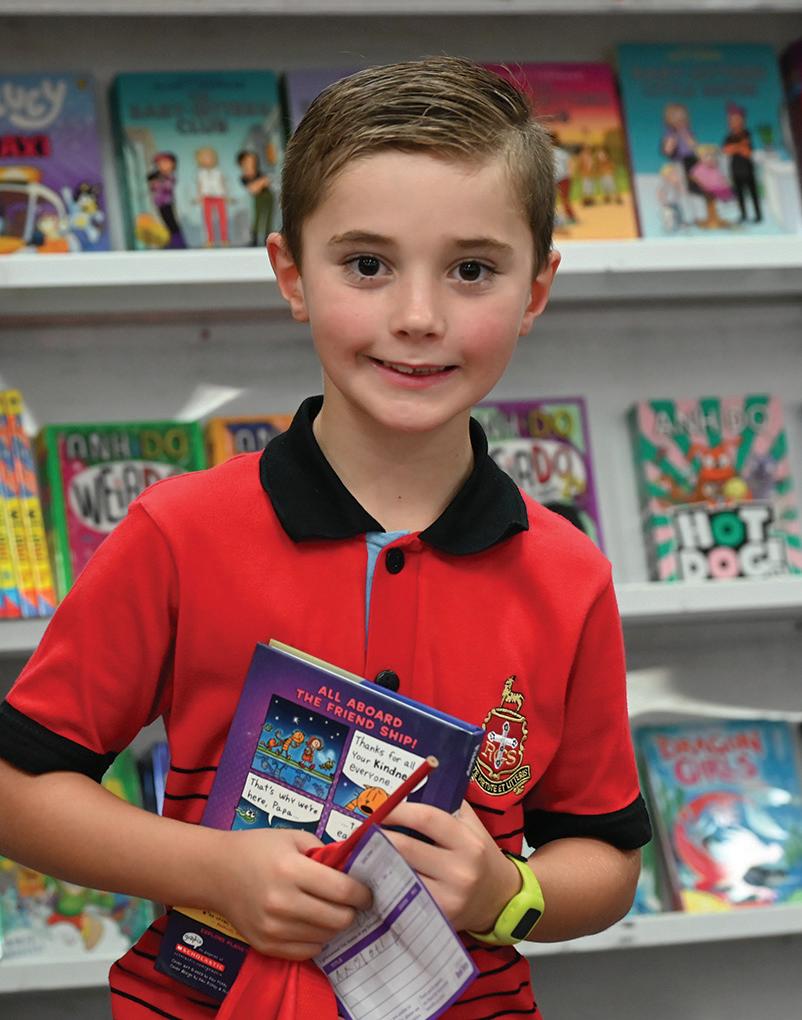
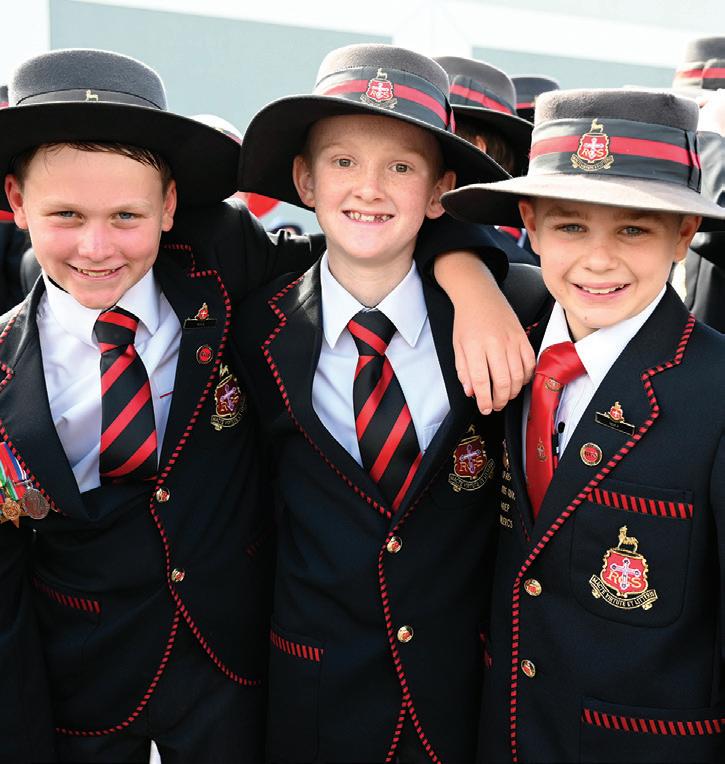
CLOCKWISE FROM TOP LEFT:
It’s all smiles at a combined Primary and Secondary Just Dance in the Spaceframe; Year 1 students Gemma Egan and Matilda Willer engage in some creative writing; Year 2’s Charlie Bradshaw prepares his list at Book Fair in the RGS Library; Joining RGS at the Rockhampton ANZAC Day march are Year 6 students Richie Simpson, Chase Tippett, and Henry Houghton; RGS Show Cattle team members Emmerson Lee, Sienna Matthews, Maya Williams, and Johanna Hempseed, Year 7, at the Rockhampton Show; Supporting the Relay for Life Bake sale are Year 11 students Tonina Nezic-Moon, Millie Burnett, Taylah Tebbatt, and Twaha Noor; 8A Form Camp students set sail at Ritamada; Year 8’s Blaze Cameron hits the field in the Year 7/Year 8 AFL Gala Day at Kele Park; Year 4 students Charlee Sheppard and Munroe Anderson attend the Rockhampton ANZAC Day march.
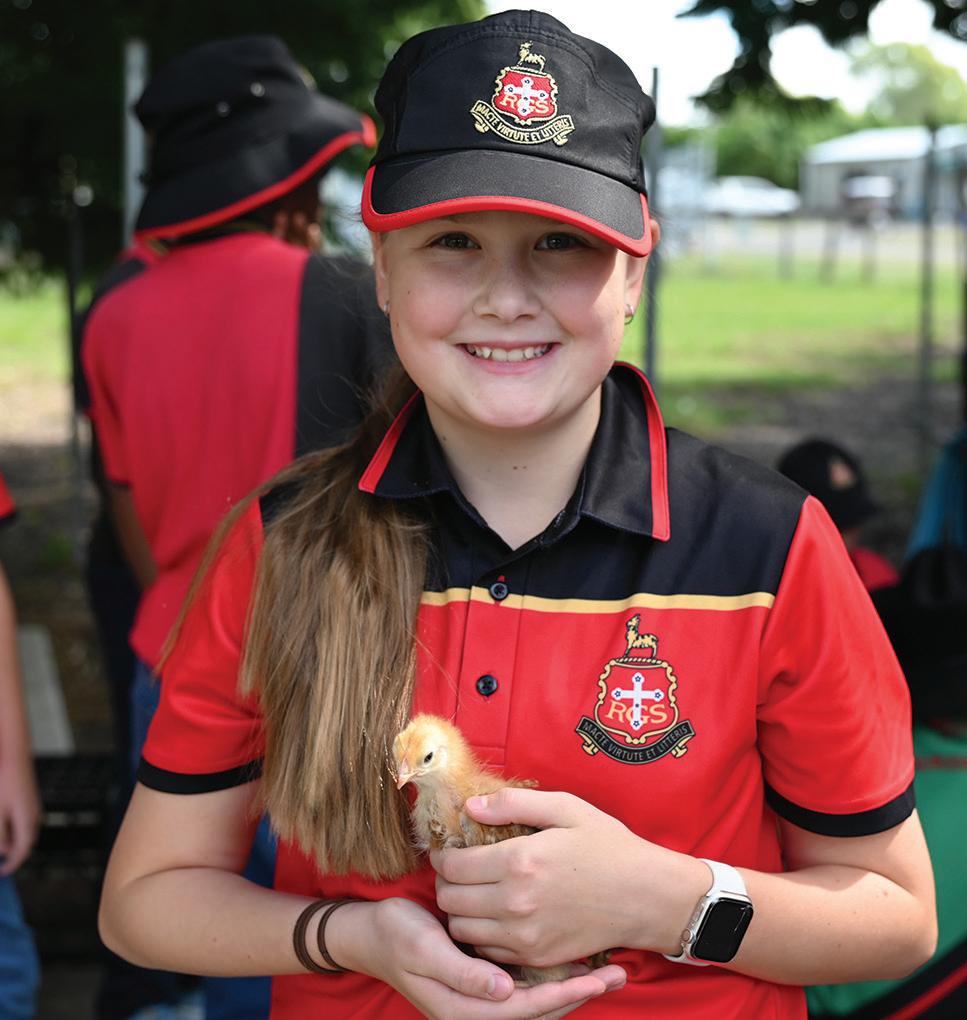
CLOCKWISE FROM TOP LEFT:
Year 7 student Chelsy Jefferies finds a cuddly friend at her Agriculture class at Port Curtis Farm; Year 3 students Ruby Kele and Lucy Sheppard collect some produce for their cooking lesson; Year 6 student Peter Kininmonth joins the RGS team at the interschool chess tournament; Farmers Challenge winners for 2025 were Year 12 boarders Luke Frame, Harry Simmonds, Ben Baillie, and Riley Bender; Elijah Sparks and Ishitha Kainth work on their bug activities at the Year 1 Bug Ball celebrations; Catching up at Primary Before School Reading are Year 11 student
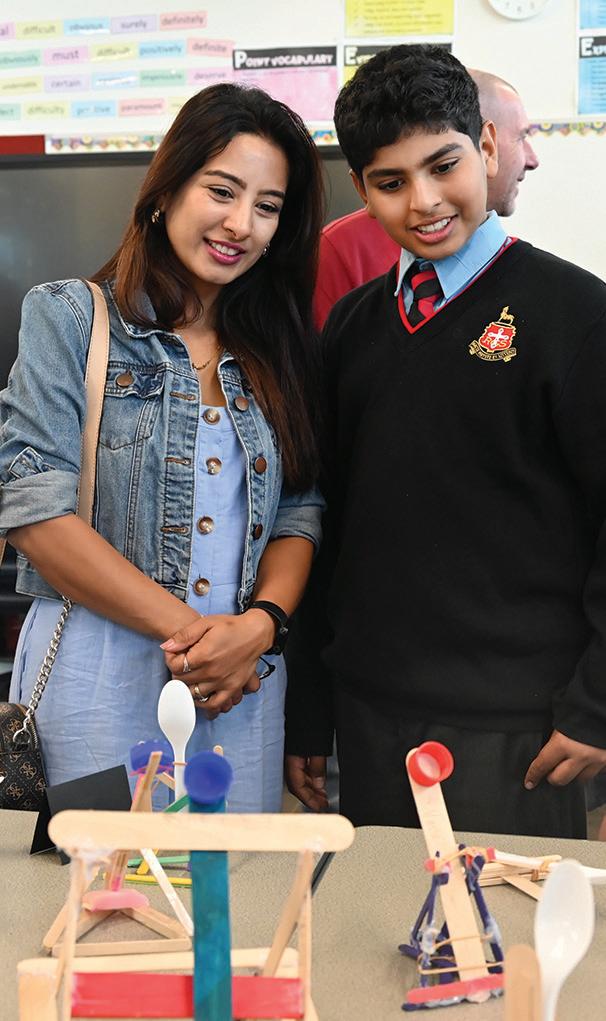
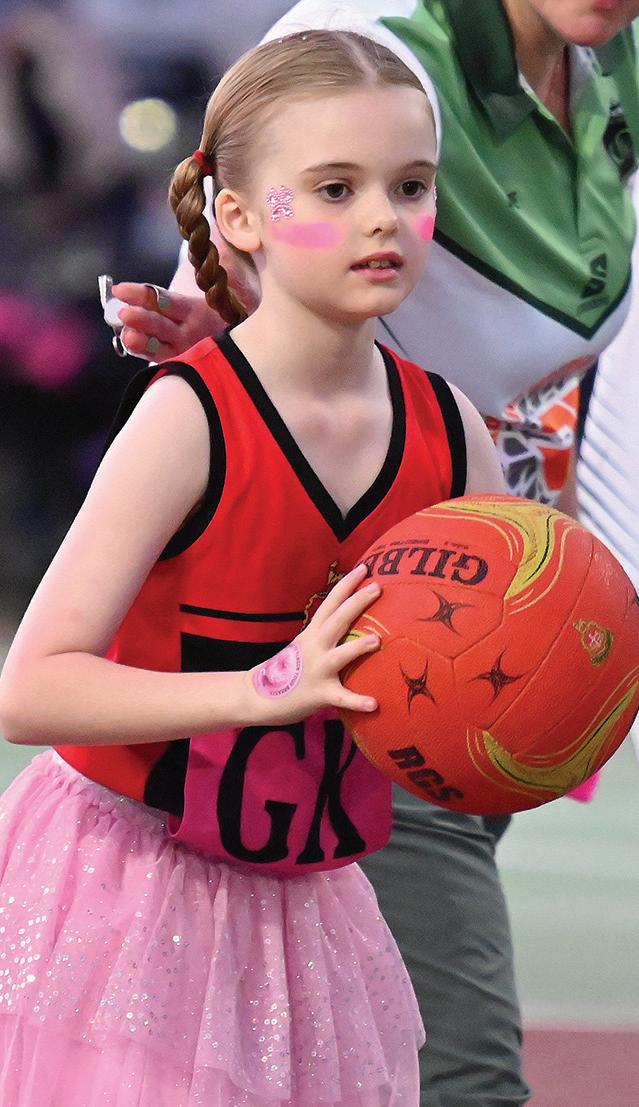
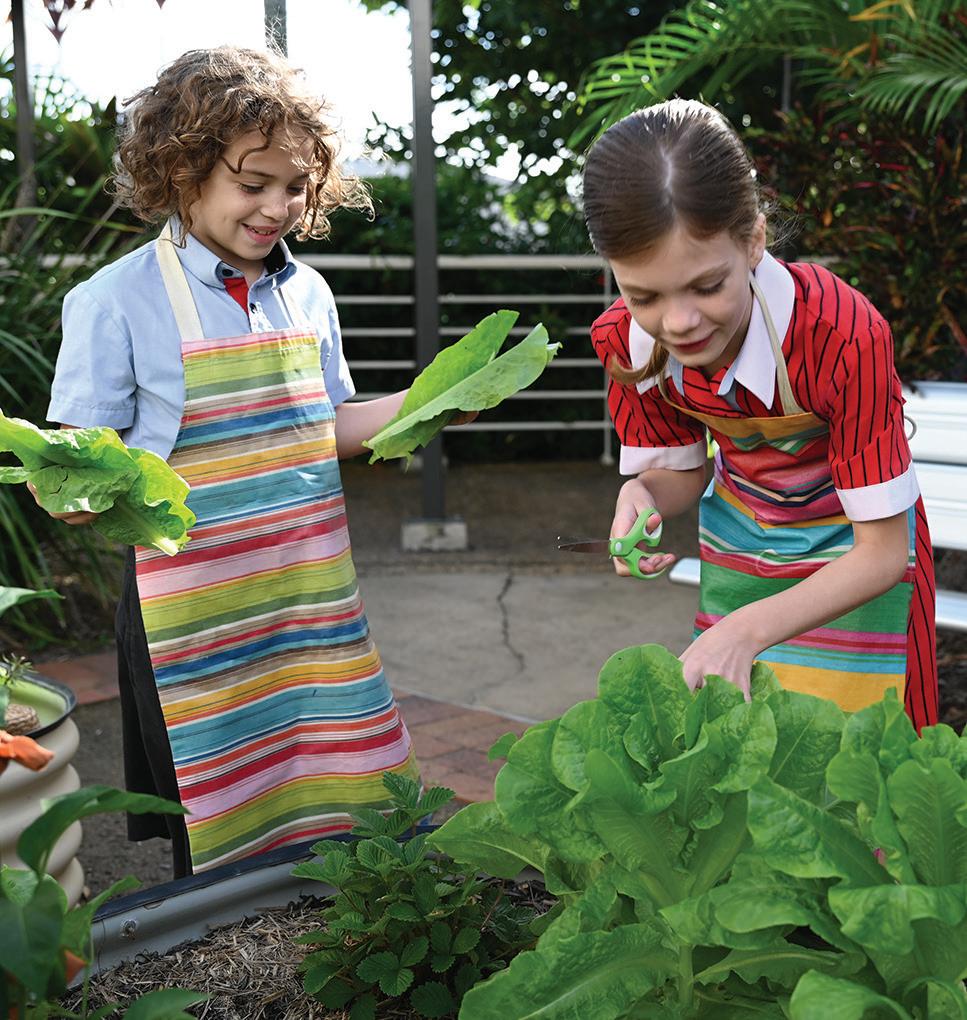
Kalani Williams and Year 5 student Harrison Delaney; Enjoying an afternoon at Art Club are Year 8 students Madilin Ward and Alyssa Tummon; Spencer Besch in action for the Year 11/12 football team last in Term 2; Leo Fanuatanu Year 12, takes on the defence at the Confraternity Carnival; Year 3’s Addie Geddes joins the RGS netball teams celebrating Pink Week at Jardine Park; Aarnam Yadav is joined by his mother Manisha at the Year 7 Showcase; Year 3’s Harin Lim prepares for the RGS Music Festival; Cooper Becker, Year 7, prepares for a rowing regatta on the Fitzroy River.
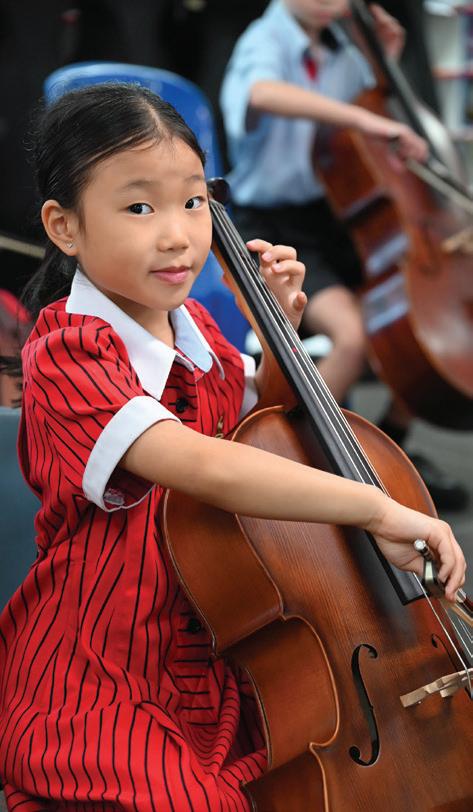
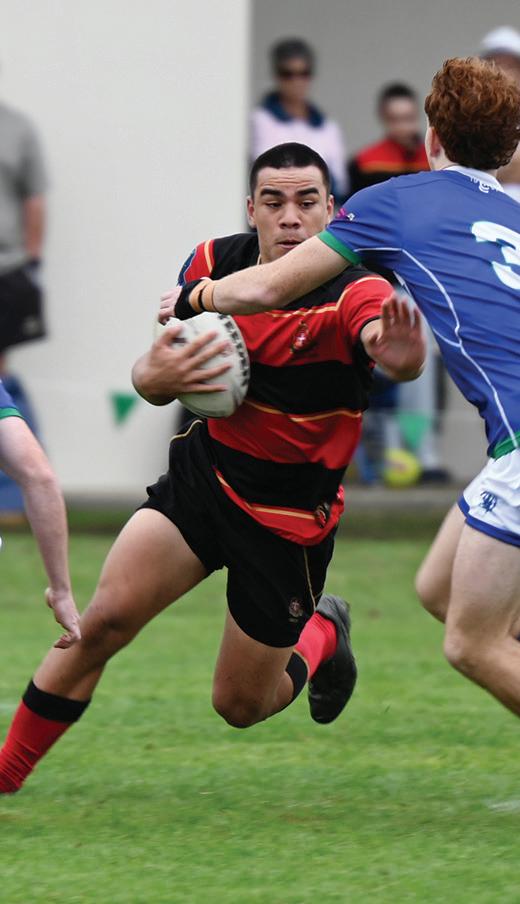
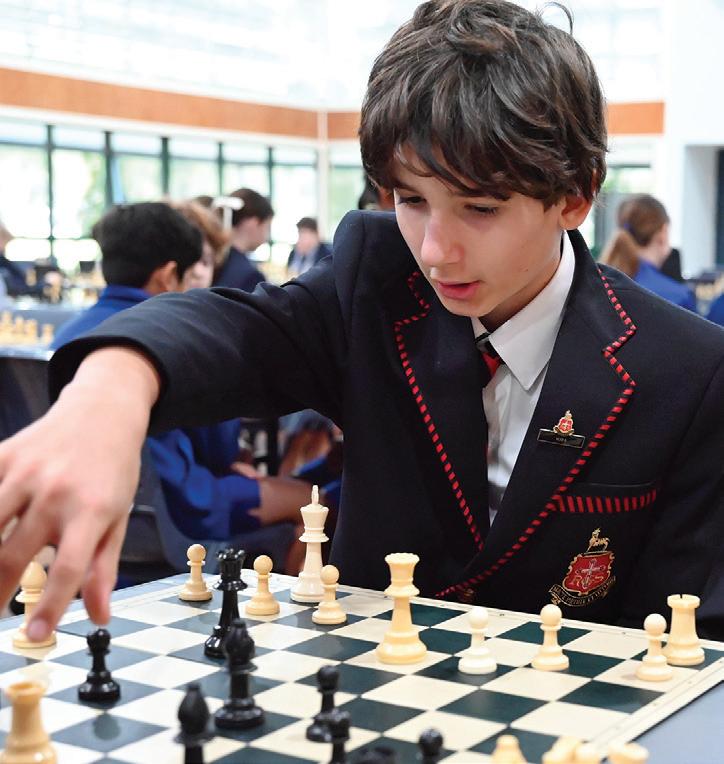
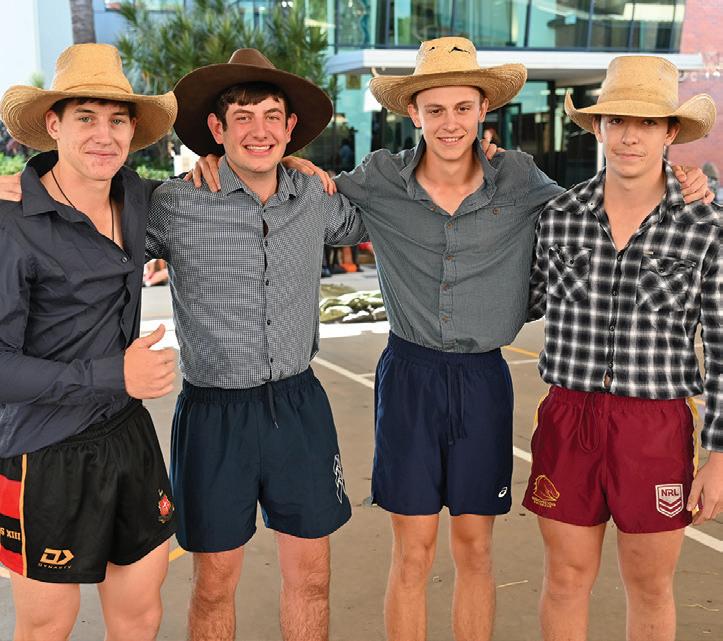
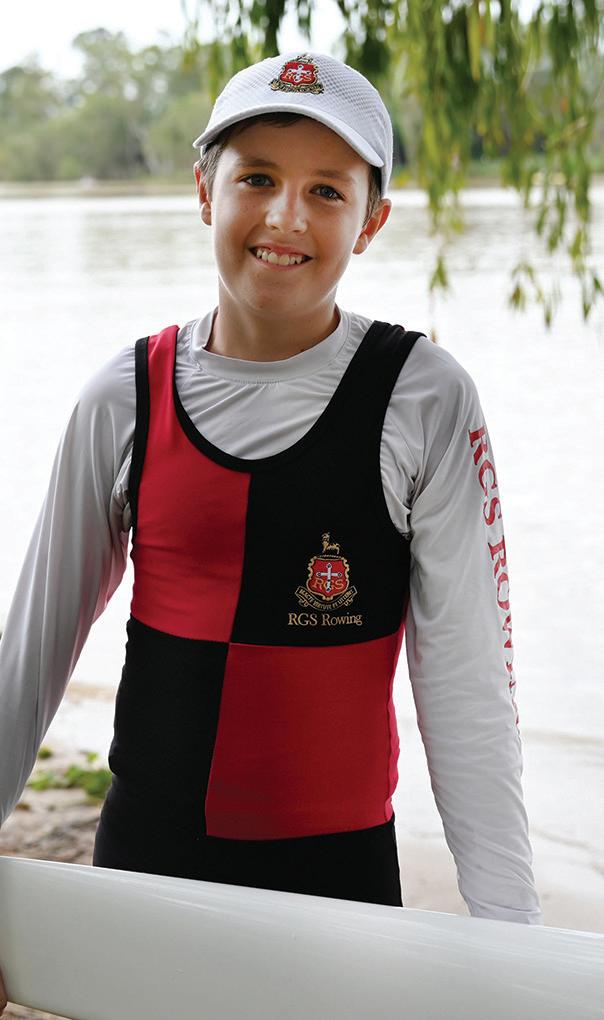
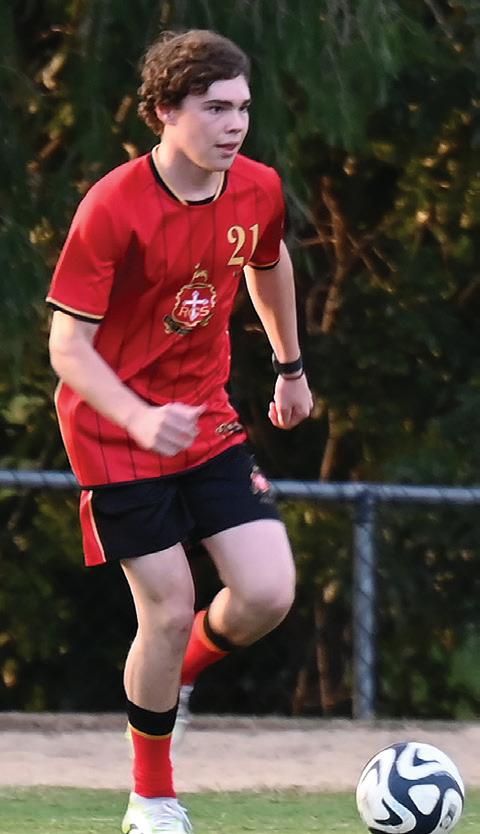
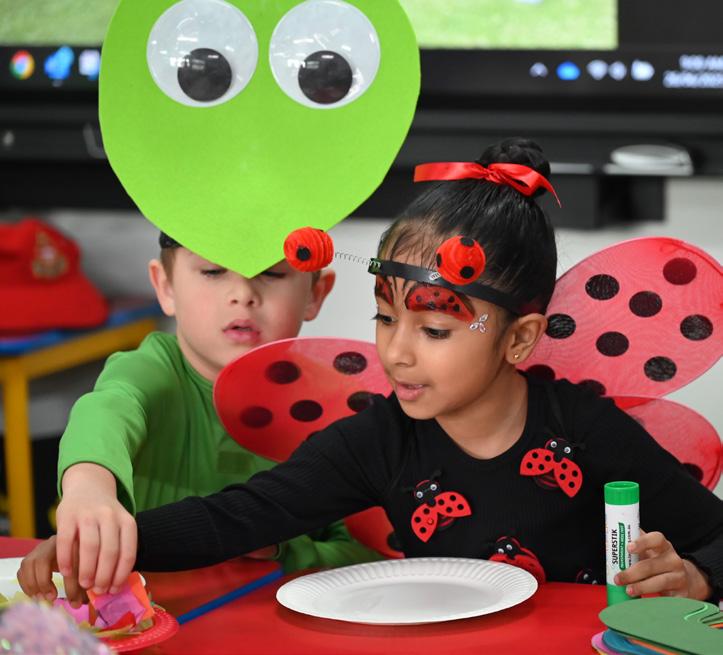
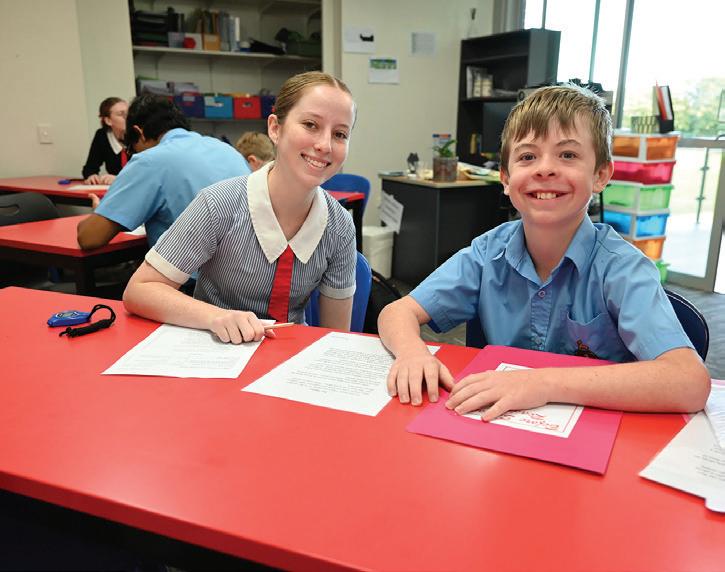
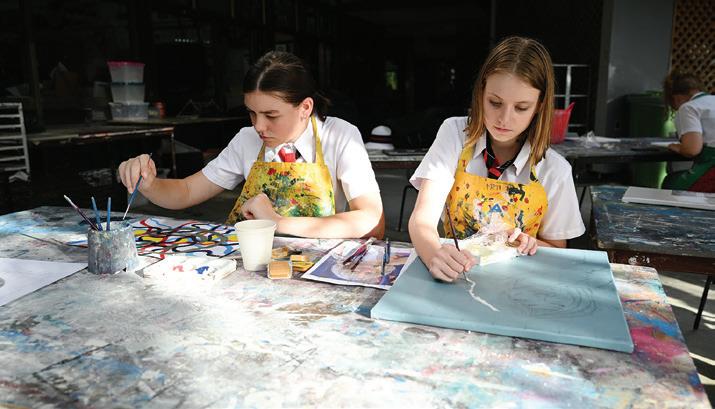
The final word
Be Social. Be Smart. workshops for RGS Year 11 and Year 12 students focussed on what contributes to a positive personal brand and how you go about building it using social media platforms. Be Social. Be Smart Founder Sally Dwyer provides her insights into today’s digital world for teenagers.
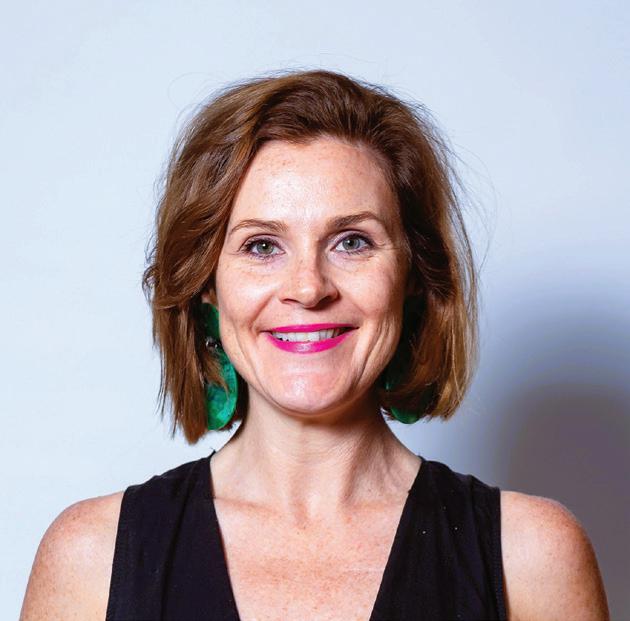
In today’s digitally driven world, teenagers are growing up with social media as a natural extension of their social and academic lives.
For parents, it’s easy to focus on the risks – safety, cyberbullying, screen time, and inappropriate content – but there’s another side of the story that’s equally important: social media can be a powerful tool for helping young people succeed in their future careers. The key lies in helping them cultivate a healthy, positive digital footprint.
A digital footprint is the trail of information a person leaves online – from Instagram posts and TikTok videos to comments on YouTube or articles they share on more professional platforms like LinkedIn.
For today’s teens, who have in many cases been using social media from as young as 10, this footprint begins forming well before they consider full-time employment, yet it can have real-world consequences later.
Surveys show that 70% of employers use social media to screen candidates during the hiring process, and 54% have decided not to hire a candidate based on what they found on their social media profiles.
However, employers are usually not going on to social media to find reason NOT to hire someone, rather to affirm that that candidate is the right person for the job.
This means that a teen’s online presence can either open doors in their future –or close them.
Parents and educators can play a crucial role by encouraging their children to think critically about what they post, who they interact with, and how they present themselves.
Teens should understand that their digital actions today may be viewed years from
now by a potential employer or someone in a position to give them a part-time job, work experience or an internship.
At Be Social. Be Smart. we like to focus on the positive use of social media platforms and highlight the unique opportunity they present to stand out to potential employers.
When used positively, social media can serve as a personal branding tool that highlights a teen’s values, interests, achievements, experience and leadership.
A teen who shares their photography on Instagram, discusses social issues on Twitter, or showcases a coding project on TikTok is demonstrating initiative, passion, and skill. These are qualities that future employers and universities look for.
Increasingly, social media platforms are also being used for professional networking by younger users.
For instance, LinkedIn is no longer just a tool for seasoned professionals – students as young as 16 can build profiles to connect with mentors, research careers, reflect on achievements and find work experience opportunities.
So, how can we help our teens?
1. Start conversations early: Talk with your teen about how social media can impact their future. Discuss the importance of privacy settings, respectful communication, and the permanence of online posts.
2. Review their digital footprint: Google your teen’s name together – see what comes up and whether their current online presence aligns with how they want to be seen. Review their social media bios, usernames, and profile pictures for professionalism and appropriateness.
“Surveys show that 70% of employers use social media to screen candidates during the hiring process.”
3. Encourage intentional posting: Suggest they share content that reflects their interests, goals, and values – such as volunteering efforts, school projects, or achievements.
4 Model good behaviour: Teens often emulate adult behaviour online. Show them how you use social media professionally and positively.
In the digital age, first impressions are often made online – long before a handshake or a job interview.
Helping your teen build a strong, authentic, and positive social media presence is an investment in their future. It’s not just about protecting them – it’s about preparing them to thrive in life after school and in their future careers.
LINKING SOCIETY:
RGS Head of Secondary School –Academics Ms Reniece Carter provides her insights into the benefits of LinkedIn in the world of careers:
“In the 20 years since it was founded in a Silicon Valley garage, LinkedIn has become one of the most popular apps in Australia. In fact, recent research shows LinkedIn has the potential to reach approximately 63% of all Australians. Given this, it is imperative RGS students are exposed to this platform,’’ Ms Carter said.
“According to the recently published article, ‘LinkedIn Statistics: 2025’ (March 11 2025), over 11,000 job applications are submitted every minute and 72% of recruiters use the platform to source talent. Hence, ensuring our students are familiar with LinkedIn allows them to proactively connect with potential employers and to network as an avenue to enhance future pathways.”

